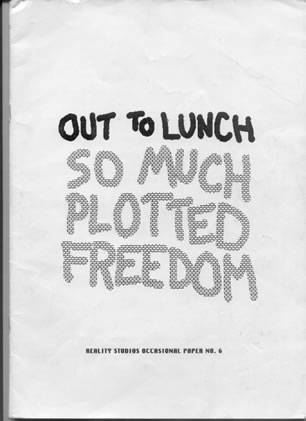
This paper was written by Out To Lunch in Leeds in late 1982 and early 1983, and published in 1987 by Ken Edwards at Reality Studios as "Occasional Paper No 6", printed by Bob Cobbing on the Writers Forum photocopier (ISBN 0 9507018 4 X). Some of its gearchanges between literary criticism and social critique/denunciation now appear to me jagged and incredible; this was before music journalism taught me to mediate more graciously between enthusiasm for marxist and freudian tenets and criticism in the here-and-now. The text is haunted by immature sex guilt, transposed into a would-be dialectician's fear of immobile, transhistorical structures. Manic freudianism will not abandon basic Id-defence, even when the Id is defined in mythic terms. The positive programme is that socialist, historical-materialist comprehension will assuage every demon and bring each ashamed proclivity into the warmth and light of collective amusement and indulgence, a hope as yet unsullied by the cascades of sex-guilt and self-hatred inculcated by tabloid campaigns against paedophiles in the next two decades. Somewhere in this rambling and contradictory missive is a radical post-individualism trying to get out, permanently frustrated by poodle play's inability to maintain a sketched ideal without tearing the paper and revealing the ragged-trousered philanthro., pissed beneath. So Much Plotted Freedom's joking yoking of sadomasochism and revolution would lie in abeyance until the "fiction" at the conclusion of Shitkicks & Doughballs. Nevertheless, the essay's dogged (and dodgy) instance on sexual "substructure" still makes for a stirring, semi-arousing read (not to mention the piquant imagery of its machine porn), and given the commercial/outreach anxiety which warped all intellectual endeavour in the later 80s and 90s, it's heartening to put on show a polemic that cares so exclusively about literary images' relationship to truth. Minor improvements have been made in the interests of clarity, and some feeble-minded meanderings excised. Graphics have been scanned from the original cuttings, which should restore a b&w zing missing from the paper edition (for some reason I provided Edwards/Cobbing with inferior photocopies rather than originals). The text alone runs over 40 pages on most printers (even without the 48 images), so don't print this out until you're sure it's really your poison, fishface. If this goes down well, I'll ask Esther if she'll put up 1-2-3-4, the account of punk I printed on the SWP Roneo in 1980 and which no-one else wants to republish.
OTL, Somers Town, 17-vi-2002

So Much Plotted Freedom: the cost of employing the language of fetishized domination - poodle play explores the sex economy of Henry James' lingo jingo.
Dubliners is a dry and dreary book until you've learned the relativity of Joyce's discourse from Ulysses. Likewise the novels of Henry James, though because he never took an explicit leap into the outrages of modernism, we must go outside his work to find the key to his effects. The ring on which this key hangs is predictably enough the average round of circus tricks available to the negative dialectician of poodle play, passing through to the left as the graven slogan, Rubbish Is Pertinent, and out to the right as the manacles of economic limitation, fodder both wideranging and crucial, somewhat out of breath and smelling of vanilla, inclusive - at this juncture - of: fake antiquity in sofas (cf Con Safos by Ruben & the Jets (1)); phrases on the containers of pharmaceutical products read while defecating; the collected works (recently published by Agneau) of Home For Dinner; slang misunderstood and misapplied from Barking Pumpkin Records; coincidental images hacked from adornoite pilasters; the usual random sample of recent poodle encounters and bad jokes, token pearls and a few pork chops. Familiarity with such debris sharpens the intention to ground each possible utterance to its concrete, material niche, damping down the vagaries of spirit: this debris being an infinitely preferable millstone to stacks of Scrutiny or Stalin in the Moscow edition, if destined for the same ultimate neck-tie loosening as the party hots up and workers prepare for power.
Actually, prior to poodle play's rubbishing catalysis, Henry James' discourse appears less dry and dreary than irrelevant and over-stuffed, hung up to effete extinction on European art and culture. This appearance is ripe for rending, because, though historically accurate, it would limit the uses to which the writing could be put: egged on by the negative dialectic of poodle play, they body forth information on flesh, commodity and their interchange with a brawny regularity that doesn't chicken out, making the old poser seem almost useful. At this point the pursuit of a certain facade should crumble like a baroque church in the spanish sun, making way for the sweet waters of quotation and commentary. Of course it won't - did you really expect to start enjoying yourself already?
Incredulity in the face of these assertions will probably take the form of a protest that what here poses as "analysis" is mere reductionism - poodle play makes everything the same - after all, wasn't all this said about Hart Crane in Equofinality?(2) Such criticism cannot sense the infinite rebound generated by the warpage of the sexualized dialectic. The materialist specification is ever the sore thumb in the idealist consensus: a consensus which assumes variety where there is none ("freedom of choice") and poses unity where it cannot be had ("the individual").
 What follows will indeed stupidly, predictably, vacantly harp on strings that
are there for the twanging (3), the readymade structures of desire. Due champing
at the bits left on the side by the culture of affirmation and profit leaves
the truth - and the truth is always of unfreedom - to be read in denials, contradiction
and subterfuge. The apparatus is classic, even crude - feet, pertinacity, cocks
and cunts, the thongs of bondage - but their placement in the literary material
needs definition and specificity. The abstract metaphysics of desire are boring
and pretentious as well as susceptible to recruitment to the right, the "end
of history": poodle play intends to demonstrate and prove, unafraid of seeming
weird, pleased at being merely undeniable. We go straight for the concrete,
knowing this is new, it's jungle-fresh: if the perversities of desire were as
repeatable as they say, we wouldn't be sitting here doing this, I promise you.
What follows will indeed stupidly, predictably, vacantly harp on strings that
are there for the twanging (3), the readymade structures of desire. Due champing
at the bits left on the side by the culture of affirmation and profit leaves
the truth - and the truth is always of unfreedom - to be read in denials, contradiction
and subterfuge. The apparatus is classic, even crude - feet, pertinacity, cocks
and cunts, the thongs of bondage - but their placement in the literary material
needs definition and specificity. The abstract metaphysics of desire are boring
and pretentious as well as susceptible to recruitment to the right, the "end
of history": poodle play intends to demonstrate and prove, unafraid of seeming
weird, pleased at being merely undeniable. We go straight for the concrete,
knowing this is new, it's jungle-fresh: if the perversities of desire were as
repeatable as they say, we wouldn't be sitting here doing this, I promise you.
Desire depends upon the social mechanisms it resists: unlike political truth which can reside intact in its unattractive wrapping, hierarchy makes pleasure possible at the same time as denying it. Radical modern art aims to smash the hierarchies, pull the rug from significance - but in the process becomes addicted to powerlessness. Hostility to hierarchy that would revolutionize desire can only build from specific accuracy and proof. Citation is hence central to poodle play, sneering as it does at the educated overview, sucking at your pipe and pondering the import of Proust. Writing must be raided for irreducible documentation of the lie in high culture, the physical bottom to elevated discourse, the libido that bursts in language when it most denies it. The basic programme is in Freud, but in the realm of psychoanalysis the necessity for some sense of decency in holding down academic posts has meant that the best, most degrading insights have been turned to reactionary pessimism about man's nature, or praise for Joyce the Genius. This has stifled the possibilities of appreciation as desecration, the pursuit of literature's productive forces to its own demise, demonstrating the ludicrous erotica of Henry James.
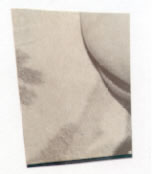 Using
the precious hesitation of the refined upper classes - at a time when this refinement
has become a commodity like any other - James writes in sentences that obsessively
seek to restrain meaning. All the while he so aware of possible meanings - via
puns, sexual applications, typographical shifts, metaphorical extensions - that
each syllable really amounts to libidinal provocation. Despite the vapid nature
of the issues under scrutiny - bourgeois marriage and feudal beauty - the following
phrase always recognizes the objective externality or materiality of the preceding
words. It takes on, either via denial or extension, meanings that weren't originally
"meant". James' succession of clauses psychoanalyse each other, pursuing the
freudian technique of interpretation without reference to the patient's subjective
intention. Seeing where a ricochet of possible meaning is blocked entails the
development of a negative map of repression. It takes you out, makes you (while
the text stays home) ford inner rivers. In like manner, the latest technically
advanced poetry - for example, that of J.H. Prynne - draws out latent connections
between words, inviting the reader to construct a paranoid system in order to
explain the empirical twang in the language: the resulting interpretation has
less to do with the text in question than the reader's repressed desires - sex
reflected in a mirror, or High Pink On Chrome.
Using
the precious hesitation of the refined upper classes - at a time when this refinement
has become a commodity like any other - James writes in sentences that obsessively
seek to restrain meaning. All the while he so aware of possible meanings - via
puns, sexual applications, typographical shifts, metaphorical extensions - that
each syllable really amounts to libidinal provocation. Despite the vapid nature
of the issues under scrutiny - bourgeois marriage and feudal beauty - the following
phrase always recognizes the objective externality or materiality of the preceding
words. It takes on, either via denial or extension, meanings that weren't originally
"meant". James' succession of clauses psychoanalyse each other, pursuing the
freudian technique of interpretation without reference to the patient's subjective
intention. Seeing where a ricochet of possible meaning is blocked entails the
development of a negative map of repression. It takes you out, makes you (while
the text stays home) ford inner rivers. In like manner, the latest technically
advanced poetry - for example, that of J.H. Prynne - draws out latent connections
between words, inviting the reader to construct a paranoid system in order to
explain the empirical twang in the language: the resulting interpretation has
less to do with the text in question than the reader's repressed desires - sex
reflected in a mirror, or High Pink On Chrome.
James is no modernist: it's not the intent of poodle play to dissolve all history into one, read Marx in Adam Smith and the trappings of parodied paedophilia in Burundi drums and Punjabi filmscore music. But James' intense fusion of eroticism and repression, a riot of significance held and provoked by restraint and precision, requires the same degree of sexual and material analysis as texts more overtly modernist. It is possible to enthuse about James without using these techniques, but doing that begs the question of why talk about him at all. Since our project is nothing more than the political psychoanalysis of Henry James - its trashy specificity saving it from the longueurs of Fredric Jameson's exploration of the political unconscious, which is distinctly too St Bruno and lullaby for us - it delineates structures via dialogue, not via the promotion of finished myths. The relationship between the twang and domination was referred to in "Out To Another Lunch Party":
 "The
demands of industrial society are constantly poeticized as bonds, thongs, cables;
in straining against them human subjectivity makes them taut and they can be
plucked." (4)
"The
demands of industrial society are constantly poeticized as bonds, thongs, cables;
in straining against them human subjectivity makes them taut and they can be
plucked." (4)
This describes Hart Crane's industrial lyricism. It lies at the opposite end of the scale from James, who sees the world from the point of view of consumption, commodity choice in array. Nevertheless, whatever the social plane from which society is viewed, it is still the same society: James' version of twang and domination, the reverberations of restriction, can be documented in terms which are surprisingly (or, on the other hand, predictably, boringly) close to the reversed Platonism of OTALP's cranial conceits:
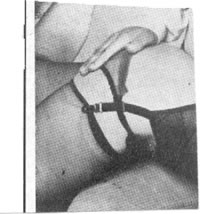 "A
personal passion for him had all but thrown her into his arms (the sort of thing
that even a vain man - and Nick was not especially vain - might hesitate to
recognise the strength of); held in check with a tension of the cord at moments
of which he could still feel the vibration, by her deep, her rare ambition,
and arrested at the last only just in time to save her calculations." (The Tragic
Muse, p. 297).
"A
personal passion for him had all but thrown her into his arms (the sort of thing
that even a vain man - and Nick was not especially vain - might hesitate to
recognise the strength of); held in check with a tension of the cord at moments
of which he could still feel the vibration, by her deep, her rare ambition,
and arrested at the last only just in time to save her calculations." (The Tragic
Muse, p. 297).
Crane, like Adorno and Horkheimer in Dialectic of Enlightenment, saw subjectivity as the sexual object bruised by bourgeois property relations - possessive individualism, male power and the logic of industrial capitalism. James' version of this theme is a welcome antidote to the potential of this duality for idealism and a purely cultural politics.
The political
expressions of such dualism are various kinds of anarchism and separatist -
or halfheartedly separatist - feminism. The world is conceived in terms of polarities
which are never superseded, neither by an idealist dialectic that would explain
them as an expression of the necessity of contraries for the working of human
thought, nor by a materialist dialectic that would understand in them the operation
of ideology in class society. Instead, various poles are preferred because they
are - simply, morally - better. Soft is better than hard, female than male,
vegetable than meat, organic than mechanic. Colin MacCabe steers dangerously
close to it when he starts to praise Leopold Bloom's sexuality over Blazes Boylan's:
 "Those who wish
to burst the membrane and affirm their own presence, Dollard and Boylan, are
contrasted with Bloom and the reader playing on the surface of the text with
their own absence." (5) To make choices within the polarities offered us by
myth is to remain on the level of myth: psychoanalysis and marxism are distinguished
by a drive to consciousness. We want the real and we want it now. It is comprehension
of the determining mechanisms behind contradiction and binary choice which gives
these philosophies of intervention a claim to science. This explains why modernism
so often upsets the well-intentioned choices of liberal humanism: by choosing
within the terms of ideology, we put a seal of approval on the system that always
seems to choose wrongly. Of course MacCabe can argue that Bloom and the lucky
reader are closer to the point of comprehension than Dollard and Boylan since
they are perverse (according to Freud's observation that all humanity is condemned
to perversion - or, failing that, to neurosis), and so consciously pursue pleasures
that Dollard and Boylan only enjoy by accident. Bloom is certainly more sympathetic
than the other two loudmouths, but if consciousness is really the criterion,
why not say so? To base one's politics on sexual taste is merely prurient tautology.
More seriously, binary moralism leads to dismissal of what resists the drive
to consciousness as merely "wrong". This is a retreat into the security blanket
of purism. In fact this resistance requires, not evasion, but analytical work.
"Those who wish
to burst the membrane and affirm their own presence, Dollard and Boylan, are
contrasted with Bloom and the reader playing on the surface of the text with
their own absence." (5) To make choices within the polarities offered us by
myth is to remain on the level of myth: psychoanalysis and marxism are distinguished
by a drive to consciousness. We want the real and we want it now. It is comprehension
of the determining mechanisms behind contradiction and binary choice which gives
these philosophies of intervention a claim to science. This explains why modernism
so often upsets the well-intentioned choices of liberal humanism: by choosing
within the terms of ideology, we put a seal of approval on the system that always
seems to choose wrongly. Of course MacCabe can argue that Bloom and the lucky
reader are closer to the point of comprehension than Dollard and Boylan since
they are perverse (according to Freud's observation that all humanity is condemned
to perversion - or, failing that, to neurosis), and so consciously pursue pleasures
that Dollard and Boylan only enjoy by accident. Bloom is certainly more sympathetic
than the other two loudmouths, but if consciousness is really the criterion,
why not say so? To base one's politics on sexual taste is merely prurient tautology.
More seriously, binary moralism leads to dismissal of what resists the drive
to consciousness as merely "wrong". This is a retreat into the security blanket
of purism. In fact this resistance requires, not evasion, but analytical work.
The precise sexual leaning evinced in the James quotation is perverse, but it isn't membranous scribbling simply because it doesn't go for penetration. Existentialism apes religion by choosing a moment of profundity in a philosophical train that should in fact brook no stoppage, moving in a dialectic shunt between theory and practice. MacCabe's sexual would-be politics perpetrate a similarly erroneous hiatus in the freudian trajectory, valorizing certain stages over others, so I can feel blooming wonderful if I'm smearing shit, but go to the blazes if I'm screwing. The Jamesian trick, on the other hand, won't declare allegiance to either camp. It outwits the binary moralism endemic to second-string commentary.
The sex act in the James sentence cited above is coitus interruptus: the male member remains poised, quivering and erect, on the verge of entry - however it stays stock still, afraid that any contact will lead to orgasm, render itself flaccid and finished. She meanwhile arches her back and strains to enclose him, but she is tied down: her bonds are drawn tight and vibrate but she can't reach him. The frozen stasis of perversion. This stasis is reached "only just in time": the writing crackles with a libidinal charge, evident in the way meanings leap across from one word to another, causing momentary glows of emphasis and sudden reversals. For example "a personal passion for him" immediately implies "a personal possession for him"; "moments" of a cord suggest that it occurs through time, making it a musical chord rather than a binding cord (6). Julia is torn between two aspects of bondage, either being "thrown into his arms" or being held in check by her ambition. The first involves physical submission to the male, the second submission to bourgeois property relations. "Her deep, her rare ambition" by which Nick "could still feel the vibration" ("rare" is a term for meat that is practically raw: and hence an apt name for the vagina according to the castration complex, which sees it as a wound - "better get the gauze" (7)) is her belief-stake in the transaction of bourgeois marriage; "saving her calculations" sidles into "saving her combinations", presumably from the mess of male ejaculation. "At last only just" lubricates both members with lust juice.
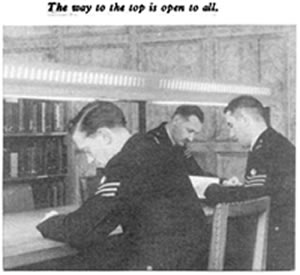 "Arrested" speaks
of stasis and also references the punitive mechanisms used to preserve private
property: police arrest and incarceration. In delineating the finest moments
of ruling class hesitation James' scrupulousness to detail, his refusal to let
a generality slip where a concrete image (however incongruous) might speak with
more precision, leads to an intensity of montage, a penetration of objective
and subjective, normally only experienced when sexuality recognizes its dependence
on objective structures (the moment of perversion). James' unavoidable jumble
of obtrusive references do not co-operate, but hold each other in check, a bringing
to consciousness of the fact that all language is mixed metaphor, that every
abstraction may be brought back to the object of its image. This discovery is
a product of bourgeois leisure, accumulation of specific insights causing anxiety,
just as imperialist stockpiling of art objects begged the question of art history:
questions only a materialist view of history can
answer.
"Arrested" speaks
of stasis and also references the punitive mechanisms used to preserve private
property: police arrest and incarceration. In delineating the finest moments
of ruling class hesitation James' scrupulousness to detail, his refusal to let
a generality slip where a concrete image (however incongruous) might speak with
more precision, leads to an intensity of montage, a penetration of objective
and subjective, normally only experienced when sexuality recognizes its dependence
on objective structures (the moment of perversion). James' unavoidable jumble
of obtrusive references do not co-operate, but hold each other in check, a bringing
to consciousness of the fact that all language is mixed metaphor, that every
abstraction may be brought back to the object of its image. This discovery is
a product of bourgeois leisure, accumulation of specific insights causing anxiety,
just as imperialist stockpiling of art objects begged the question of art history:
questions only a materialist view of history can
answer.
In Finnegans Wake, "hesitency", the misspelling that exposed Richard Piggot's attempt to frame Parnell and led to his suicide while fleeimg detectives, is used as a reminder of the connection between vacillation and guilt: the stutter dramatizing repression by asserting speech as sound rather than meaning. The late Jamesian style could be defined as perpetual hesitation, digression pursuing digression in a vain attempt to stem the tide of possible meanings - yet every dyke constructed leaves behind gravel pits in which seawater rises. James' acute sensitivity to the possible applications of the words he used causes a riot of semantics just as he'd deny them. The parenthetical insertion in the sentence under consideration - "the sort of thing even a vain man - and Nick was not especially vain - might hesitate to recognise the strength of" - illustrates how it is only by accepting hesitation as tasteful, a refinement characteristic of the upper classes, that the reader can understand what James is saying. Otherwise the persistent hesitations, sudden recognitions of the potential of words for extraneous significance, the drive to contradict what has just been said, the vortices of double and triple negatives, the layers of qualification, would indicate neurosis rather than refined taste. In fact the later James pursued hesitation until not a few contemporary critics found it distasteful. To applaud the late style is to find perverse delight in the stutterings of neurosis. To claim otherwise - to pretend that it is rather logical literary appreciation of the twists and turns of fastidious emotionalism - is to succumb to the classical aphasia of the bourgeoisie, unable to speak directly of anything considered subjectively important.
Understanding James' language requires the elaboration of unconscious structures from features that might otherwise be dismissed as peripheral, mistaken or merely naturalistic. The closest attention to psychological detail, once carried through beyond the sureties of God, confront the commodity in the form of the received idea, the vivid image: unwilling to surrender power, yet aware of the ersatz nature of phrases and metaphorical tropes with increasingly degraded use value, which owe what power they have to their exchange value, James uses them while breaking them down. He persistently interrupts them with provisos, comparisons both apposite and opposite, other metaphors, absurd extensions. The whole thing sparkles like a zirkon: facets of everyday discourse are yanked around with a violence that humiliates, demonstrating their dependence for meaning on everything but the matter in hand. Yet this vandalism does not result from a desire to bring the city to its knees, but from a will to believe in the bric-a-brac littering the culture.
James was aware of the paradoxically destructive effect of America's enthusiasm with European art, and wrote a play called The Outcry about a British family trying to prevent an American millionnaire's purchase of a painting; anxiety about his parasitical status led him to seek British nationality and a respected place in English society. James completely disassociated himself with the wave of anglophobia which swept the States over the border disagreement between Venezuela and British Guiana in 1896, calling it "horribly inferior and vulgar"(8). This however was more a product of his contempt for the masses than any repudiation of nationalism: he was pleased to be taken up by the English ruling class and saw this as recognition of the authenticity of his cultural aspirations. Of course, English bourgeois culture loved this seal of approval from the New World, the proof that everything was not to be measured by money; consolation in the face of the massive successes of republican industrialism. Leon Edel, James' slavering biographer, relates how the Master's statement concerning life in Britain at war (World War I) - "a privilege I feel it to share the inspiration" - became "one of the most characteristic Churchillian utterances of the Second World War" (9). No doubt Churchill, who used troops against the General Strike, who organized the suppression of communist-led local resistance movements in areas "liberated" from the Nazis during World War II, and who had Dresden bombed flat, could well borrow words from a master of letters who found a nation organised to deliver hundreds of thousands to filthy slaughter in the trenches an "inspiration". Trotsky, in contrast, likened the action of the countries involved in the Great War to someone who, in order to ascertain the health of his veins, calmly begins to slice at his throat with a razor. (10)
However monstrous James' ideological function in his lifetime, that is not the limit of his literary production or of the uses to which it can be put. Unlike T.S. Eliot, who performed a similar ideological function for the next generation and their war, James did not embrace formal radicalism in order to retreat into hack profundity and neo-religiosity: he aimed for a personal, aristocratic perfectionism far removed from processed pseudo-meditation or recuperative consolation. James's function was ornamental. He was not put to work supplying bourgeois reflection in commodity form, ready wrapped for Radio 3, like Eliot. This Personal Aristocratic Perfection ("pap" for short) gave James freedom to indulge a baroque erotic sensibility in the company of his obedient stenographers (preferably female, according to Edel) under the guise of "finding the right word". Pap led James to take unconscious revenge on the language of refinement, concocting sexualized grotesques clause by clause.
Bourgeois culture is a halfway house, a slippery realm with no security: in refusing the road to halfbaked profundity (which would lead to such subversive ludicrations as Marvin Gaye quoting T.S. Eliot as justification for free love on the sleeve of Let's Get It On), he was forced back into an aristocratic critique of the commodity. Conscientiously avoiding the neatly saleable reversals of commercializing the "anti-commercial", but without any illusions about evading exchange and the laws of the market, the writing became a forever extended qualification, an endless war of attrition on the very obviousness, tricks and cleverness, out of which it was constructed. There was no retreat into calling a spade a spade: after talk of emancipation, all "tradition" merely looms like reaction.
 James
discovered that refinement and perception could only be set out in vulgarities,
terms bursting with the electricity of commodity lust - to make them accurate,
to prevent them merely travelling through the text with the imperious impersonality
of fetishized market forces, required that they be set at war with each other,
making the writing difficult, personal, elitist. It also rendered it susceptible
to the simple but undeniable interpretation.
James
discovered that refinement and perception could only be set out in vulgarities,
terms bursting with the electricity of commodity lust - to make them accurate,
to prevent them merely travelling through the text with the imperious impersonality
of fetishized market forces, required that they be set at war with each other,
making the writing difficult, personal, elitist. It also rendered it susceptible
to the simple but undeniable interpretation.
This simple interpretation draws its themes and definitions from the blatant vulgar clamour James was most at pains to deny. The refusal to underwrite the false syntheses of bourgeois perception, the attempt to set them on real foundations, is fraught with peril. In saving experimental energy from the suffocating cotton wool of patronized presentation, James found he was applying it to his own materials: phrases transact operations beyond his control, images flicker unexpectedly; he would then bring them to heel, but only at the cost of awkward interpolations reminiscent of the highly-strung actions of fetishized domination, of the infantile recycling of degraded luxuries and of the shocks of electric switching - the most immediate means at his disposal, but fresh from the marketplace on which he had turned his back, and still loyal to its interpretative reductions.
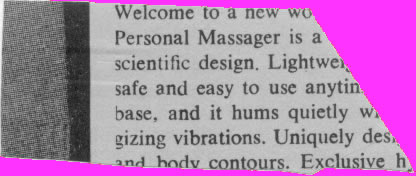
Vibration is central
to the Jamesian imagination, it contains the impact of history on structure,
sex on object, evocation on limit: a compressed imago sealed by an obvious gross
extrapolation, the VIBRATOR as mechanical sex aid. James' language understands
the charge in the word "vibrator", a prediction of its entry onto the market
as an object sold in sex shops (or, as Zappa sneeringly remarks in the "Preamble"
to "Penguin In Bondage", in the back pages of The Free Press, a song, incidentally,
which provides the obvious revelatory catalyst for vibration in James).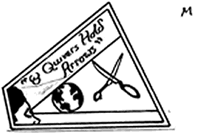 "She just quivers when she describes what our sex has been through" (The Bostonians,
p. 87). Verena is talking of Olive, the stalwart feminist whose protege she
becomes. The continual surfacing of sexual detail in James makes suggestive
play on the initial letters V and O: "Verena" is venereal, a V for vulva or
vagina preceding an arena (10), while "Olive" splits to a living story of O:
"She just quivers when she describes what our sex has been through" (The Bostonians,
p. 87). Verena is talking of Olive, the stalwart feminist whose protege she
becomes. The continual surfacing of sexual detail in James makes suggestive
play on the initial letters V and O: "Verena" is venereal, a V for vulva or
vagina preceding an arena (10), while "Olive" splits to a living story of O:
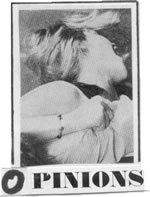 "the intolerable load of fate. It was they [ie the women, OTL] who sat cramped
and chained to receive it; it was they who had done all the waiting and taken
all the wounds. The sacrifices, the tears, the terrors were theirs. Their organism
was in itself a challenge to suffering, and men had practised upon it with an
impudence that knew no bounds." (The Bostonians, p. 159). Pauline Réage's
O quivers when she describes what has been through her sex: the first link in
Sir Stephen's chain. The male protagonist of The Bostonians is Basil Ransom
(whose very name compounds royalty and debt, power and guilt), and he is described
as a "man who, no doubt, desired to treat women with the lash and manacles,
as he and his people had formerly treated the wretched coloured race" (The Bostonians,
p. l4O). James thus exposes the actual exploitation from which eroticized domination
borrows its imagery. This classic contraction between sexism and racism points
to the way in which it is the objective aspect of James' imagery that gives
a social and political consequence to what would otherwise be of merely psychological
interest. That a formulation of his should give birth to an utterance characteristic
of Churchill should really cause no surprise: his language constantly works
over the phrases and images of contemporary ruling class discourse. The Jamesian
context is however unsettling, it gives words a wrench, generating semantic
tricks and cavorts that can frequently be read backwards. Because the literal
basis of image and metaphor sets off unconscious trains of thought, which are
then answered, deflected or otherwise worked on, the writing becomes objective:
a crystallized prism which may be read in itself, not simply relegated to this
or that vector in the superstructural diachrony.
"the intolerable load of fate. It was they [ie the women, OTL] who sat cramped
and chained to receive it; it was they who had done all the waiting and taken
all the wounds. The sacrifices, the tears, the terrors were theirs. Their organism
was in itself a challenge to suffering, and men had practised upon it with an
impudence that knew no bounds." (The Bostonians, p. 159). Pauline Réage's
O quivers when she describes what has been through her sex: the first link in
Sir Stephen's chain. The male protagonist of The Bostonians is Basil Ransom
(whose very name compounds royalty and debt, power and guilt), and he is described
as a "man who, no doubt, desired to treat women with the lash and manacles,
as he and his people had formerly treated the wretched coloured race" (The Bostonians,
p. l4O). James thus exposes the actual exploitation from which eroticized domination
borrows its imagery. This classic contraction between sexism and racism points
to the way in which it is the objective aspect of James' imagery that gives
a social and political consequence to what would otherwise be of merely psychological
interest. That a formulation of his should give birth to an utterance characteristic
of Churchill should really cause no surprise: his language constantly works
over the phrases and images of contemporary ruling class discourse. The Jamesian
context is however unsettling, it gives words a wrench, generating semantic
tricks and cavorts that can frequently be read backwards. Because the literal
basis of image and metaphor sets off unconscious trains of thought, which are
then answered, deflected or otherwise worked on, the writing becomes objective:
a crystallized prism which may be read in itself, not simply relegated to this
or that vector in the superstructural diachrony.
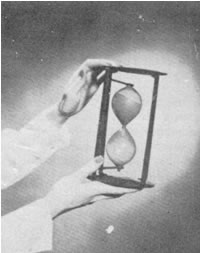 For
instance, James cannot refer to the globe without charting the anxieties of
a class that had to carve an empire on which the sun never set to keep its crimes
from coming back: "and it made Sheringham still more uncomfortable when he was
most conscious that at the best even the trained diplomatic mind would never
grasp of Miriam as a whole. She was constructed to revolve like the terrestrial
globe; some part or other of her was always in shadow." (The Tragic Muse, p.
374) Given Miriam's association with the theatre (which James courted, and then
dismissed as hopelessly vulgar when it rejected him) and her Jewish descent,
the worrying "other" is clearly for Sheringham constituted by both the indigenous
working class, the foreign and the female. Given its pogrommatic applications
in the course of the twentieth century, it's too late in the day to denounce
this mythologizing in James. Of note is the unconscious involvement of Victorian
political platitudes - "the empire on which the sun never sets" - in the delineation
of Sheringham's unease about Miriam. James' sensitivity to the material substructure
suggested in his metaphors - the shackles of slaves, gunboats in the colonies,
the exchange of commodities, global domination - surfaces like a sexual blush.
Analysis is invited by syntactical confusion which blatantly conceals (and thus
displays) the weight of buried political statements. Precisely because James
represses explicit political consciousness, it can appear as it does in the
description of Sheringham above: specific, analytic and anti-ideological.
For
instance, James cannot refer to the globe without charting the anxieties of
a class that had to carve an empire on which the sun never set to keep its crimes
from coming back: "and it made Sheringham still more uncomfortable when he was
most conscious that at the best even the trained diplomatic mind would never
grasp of Miriam as a whole. She was constructed to revolve like the terrestrial
globe; some part or other of her was always in shadow." (The Tragic Muse, p.
374) Given Miriam's association with the theatre (which James courted, and then
dismissed as hopelessly vulgar when it rejected him) and her Jewish descent,
the worrying "other" is clearly for Sheringham constituted by both the indigenous
working class, the foreign and the female. Given its pogrommatic applications
in the course of the twentieth century, it's too late in the day to denounce
this mythologizing in James. Of note is the unconscious involvement of Victorian
political platitudes - "the empire on which the sun never sets" - in the delineation
of Sheringham's unease about Miriam. James' sensitivity to the material substructure
suggested in his metaphors - the shackles of slaves, gunboats in the colonies,
the exchange of commodities, global domination - surfaces like a sexual blush.
Analysis is invited by syntactical confusion which blatantly conceals (and thus
displays) the weight of buried political statements. Precisely because James
represses explicit political consciousness, it can appear as it does in the
description of Sheringham above: specific, analytic and anti-ideological.
To return to Verena's description of Olive - "she just quivers when she describes what our sex has been through" - what makes this formulation vibrate is the O in Olive: the knowledge that in sex, on the contrary, something passes through the female. This encourages the reader to read the action backwards. The effect resembles the swapping of roles in perversion: Olive is one minute the hoop through which the penis/poodle jumps, and the next she is the penguin jumping through a hoop of real fire - the absurd exactitudes of the circus, the ringmaster cracking his whip. The confusions of "Penguin In Bondage", the questions that puzzle the allegorists - is the poodle a penis? is the penguin a penis or her body? what is the biscuit? is it nothing, or sexual disappointment, or the crux? - are reproduced in James' semantic construction.
Vibration in James is a response to contradiction, the result of simultaneously rehearsing logical opposites, as when Verena thinks: "If it could only be known that she spoke for nothing, that might deepen the reverberation" (The Bostonians, p. 90). Here the dialectical hinge shifts from reverberation to spoke, a word that provides numerous occasions for James' lettrist imagination, punning it from the past particible of the verb "to speak" to the substantial support within a wheel. "She spoke for nothing" refers to the fearful lack of phallic plenitude in the woman, the chilling realizations of the castration complex - the threat contained in the woman's inability to place the strut in the hoop (the spoke) or significantly move the tongue in the mouth (have spoken) or fuck (poke): the word pops up at every moment of tension. Dr Prince: "They don't speak. But you can hear the silence vibrate" Basil: "Vibrate?" Dr Prince: "Well, they are very nervous" (The Bostonians, p. 349).
For James, language leaves a material residue behind it, and he retains a phallic naivety in that wonderment. "Spoke" becomes both symbol and example of this process: "though who indeed could say if the manner in which she now met him spoke most, really, of the glitter of battle or of the white waver of the flag of truce" (The Golden Bowl, p. 262). Here, the end result of manner is transformed into a medieval fairy-tale lance, containing the usual pre-orgasmic dichotomy between sexual readiness (betokened by a glistening drop of pre-come) and sexual climax (which will end the process in white-spectrum brain-waves). Typically an "r" added to "wave" makes the spoke something that quivers, pumping blood into what would otherwise be inanimate; it also hints at "wafer", the sexual suggestion everpresent in enclosure (compare for instance "I like candy when it's wrapped in a sweater" from Bow Wow Wow's version of "I Like Candy"), and touches on the consummation dreamed of in communion - lunch or picnic, what really takes the biscuit is the jump from object to idea. The sudden objectification of "speak" in a "spoke" carries a shock: "with the sense of it on the spot, she had felt, overwhelmingly, that she was significant, that so she must instantly strike him, and that this had a kind of violence beyond what she had intended' (The Golden Bowl, p. 3lO). Here the metaphorical use of "strike" has indeed a violence beyond that originally intended because its literal meaning suddenly resurfaces: whether via unattested pun or sedimented literalness, James' words constantly dramatize their objective aspect. Though this is repressed (we're not reading Finnegans Wake), it becomes an excellent opportunity to watch repression at work. Interesting in this aspect is the explicit theme of The Golden Bowl, which is that of a sexual liaison whose existence is hardly admitted by its protagonists, but awareness of which skitters across almost every conversation.
 Repression
is pushed under the reader's nose: 'She couldn't challenge him, because it would
have been - and there she was paralysed - the note. It would have translated
itself on the spot, for his ear, into jealousy; and, from reverberation to repercussion,
would have reached her father's exactly in the form of a cry piercing the stillness
of peaceful sleep' (The Golden Bowl, p. 352). It matters little for our purposes
that the reason she cannot challenge him - the fear that any criticism of Charlotte
will sound as if Maggie suspects Amerigo of carrying on a sexual liaison with
her - is not directly to do with the castration complex, repression of which
leads to the twangs of "Penguin In Bondage" (accentuated in the words "She's
just like a penguin in bondage, boi-n-n-ng"). The point is that it has to do
with repression: once initiated, the dynamic of repression is to link together
all the repressed. The essential elements of "Penguin In Bondage" are here because
Charlotte's having sex with the Prince implies an unspeakable relationship between
Maggie and her father - incest. Her father's ear being pierced in "the stillness
of peaceful sleep" recalls the murder of Hamlet's father by his brother Claudius,
pouring the "juice of cursed hebona" in the "porches of his ears" (11) as he
lay sleeping in an orchard - conveniently both summoning that drama of repressed
incestuous pangs and confirming Mr Verver's edenic innocence (his first name
is Adam). "Penguin In Bondage" does not only concern fear of sexual difference,
it concerns repression - the lived stasis of terrified curiosity freezing the
look so it will not develop beyond that. Maggie's paralysis in fact vibrates,
so that even though it is repressed it still reaches its mark. In the unconscious
this news has already travelled; it is precisely "a cry piercing the stillness
of peaceful sleep", something known in a dream. The double alliteration of "p"
and "s" confirms the news as subtextual addition, information below the level
of conscious script.
Repression
is pushed under the reader's nose: 'She couldn't challenge him, because it would
have been - and there she was paralysed - the note. It would have translated
itself on the spot, for his ear, into jealousy; and, from reverberation to repercussion,
would have reached her father's exactly in the form of a cry piercing the stillness
of peaceful sleep' (The Golden Bowl, p. 352). It matters little for our purposes
that the reason she cannot challenge him - the fear that any criticism of Charlotte
will sound as if Maggie suspects Amerigo of carrying on a sexual liaison with
her - is not directly to do with the castration complex, repression of which
leads to the twangs of "Penguin In Bondage" (accentuated in the words "She's
just like a penguin in bondage, boi-n-n-ng"). The point is that it has to do
with repression: once initiated, the dynamic of repression is to link together
all the repressed. The essential elements of "Penguin In Bondage" are here because
Charlotte's having sex with the Prince implies an unspeakable relationship between
Maggie and her father - incest. Her father's ear being pierced in "the stillness
of peaceful sleep" recalls the murder of Hamlet's father by his brother Claudius,
pouring the "juice of cursed hebona" in the "porches of his ears" (11) as he
lay sleeping in an orchard - conveniently both summoning that drama of repressed
incestuous pangs and confirming Mr Verver's edenic innocence (his first name
is Adam). "Penguin In Bondage" does not only concern fear of sexual difference,
it concerns repression - the lived stasis of terrified curiosity freezing the
look so it will not develop beyond that. Maggie's paralysis in fact vibrates,
so that even though it is repressed it still reaches its mark. In the unconscious
this news has already travelled; it is precisely "a cry piercing the stillness
of peaceful sleep", something known in a dream. The double alliteration of "p"
and "s" confirms the news as subtextual addition, information below the level
of conscious script.
Frank Zappa's
Lumpy Gravy features stoned chatter and paranoid speculation about the Big Note,
which is however the ultimate power: this quotation explains why. The Big Note
is the vibration of the myriad cables of unconscious structures, the grand and
sordid apparatus that Pirandello drew and which was described by William Burroughs
in The Soft Machine as a vista of stairwells and labyrinthine lockers, tiers
of grids in chickenwire, banks of moving platforms. William Blake merged the
cotton mill and the human body to picture it. It requires precision and political
direction to fathom the unconscious in terms that do not mystify but analyse,
tracing its internalization of the unfreedoms of society as a whole. Religion
and degraded semi-mysticism - the bourgeois notion of the aesthetic response
- would block this essential delineation just when we have a chance to perform
it, making us receive gladly, consume the magical aesthetic twang when we should
really be asking why. In The Golden Bowl aesthetic tension, its high pitched
tone, is achieved by keeping revelation ever in the preconscious, orgasm forever
on the gorged tip of the erogenous organ.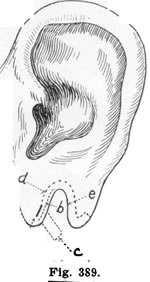 In the above, for example, Amerigo is covertly equated with Maggie's father
- both are reduced to an ear: not just jealousy but incestuous desire "would
have translated itself on the spot". The superficial niceties of the text are
products of displacement and exchange. The horror repressed is their application
to sexual arrangements: if Amerigo's virtue is to be male, why can't Maggie's
father fulfil the same function? The castration complex derives its shock from
such logic - if a woman is a man without a penis, isn't every man in danger
of losing his? So-called "bad style" is frequently created by a knock-on effect,
where the robust material substance of a signifier - whether the sound (dear
Auntie, I'm very grateful for the present, it's great) or the image that has
been mobilized for one-off usage (the ear here) - lingers, hanging over the
sense of what follows, distorting it into perceptions that weren't "meant".
In the above there is no reason for James to carry on a discussion of ears,
it's merely a fixed image on which the sense can swing from Amerigo to Maggie's
father: its anatomical existence in both has no more need to be stressed than
their common possession of a penis. Jamesian language is generated by an almost
infantile and gratuitous insistence on the extraneous aspect of signifiers he
has used: the sexual accuracy we read in it is a product of such free association,
not of the pure Platonic signified idealists love to dribble over.
In the above, for example, Amerigo is covertly equated with Maggie's father
- both are reduced to an ear: not just jealousy but incestuous desire "would
have translated itself on the spot". The superficial niceties of the text are
products of displacement and exchange. The horror repressed is their application
to sexual arrangements: if Amerigo's virtue is to be male, why can't Maggie's
father fulfil the same function? The castration complex derives its shock from
such logic - if a woman is a man without a penis, isn't every man in danger
of losing his? So-called "bad style" is frequently created by a knock-on effect,
where the robust material substance of a signifier - whether the sound (dear
Auntie, I'm very grateful for the present, it's great) or the image that has
been mobilized for one-off usage (the ear here) - lingers, hanging over the
sense of what follows, distorting it into perceptions that weren't "meant".
In the above there is no reason for James to carry on a discussion of ears,
it's merely a fixed image on which the sense can swing from Amerigo to Maggie's
father: its anatomical existence in both has no more need to be stressed than
their common possession of a penis. Jamesian language is generated by an almost
infantile and gratuitous insistence on the extraneous aspect of signifiers he
has used: the sexual accuracy we read in it is a product of such free association,
not of the pure Platonic signified idealists love to dribble over.
The saving grace
of decadence is its proto-dialetical tendency to self-reference: in James, the
equivalence of signifier, image and commodity, referred to as the phallus, or
referred to in phallic terms, is ceaselessly commented on: James draws out "the
possible heroism of perfunctory things" (The Golden Bowl, p. 494) with results
similar to those the surrealists discovered and then mystified in commercialized
irrationalism and witty tricks. Each time James uses a metaphor, he considers
the way in which words conjure an object which does not evaporate so easily.
The tension language needs to hold on to the external world, to keep it in shape,
can be translated into analysis of other systems - militarism for instance:
 "The colonel sat
back at his own ease, with an ankle resting on the other knee and his eyes attentive
to the good appearance of an extremely slender foot which he kept jerking in
its neat integument of fine-spun black silk and patent leather. It seemed to
confess, this member, to consciousness of military discipline, everything about
it being as polished and perfect, as straight and tight and trim, as a soldier
on parade. It went so far as to imply that someone or other would have "got"
something or other, confinement to barracks or sup- pression of pay, if it hadn't
been just as it was." (The Golden Bowl, pp. 7l-72).
"The colonel sat
back at his own ease, with an ankle resting on the other knee and his eyes attentive
to the good appearance of an extremely slender foot which he kept jerking in
its neat integument of fine-spun black silk and patent leather. It seemed to
confess, this member, to consciousness of military discipline, everything about
it being as polished and perfect, as straight and tight and trim, as a soldier
on parade. It went so far as to imply that someone or other would have "got"
something or other, confinement to barracks or sup- pression of pay, if it hadn't
been just as it was." (The Golden Bowl, pp. 7l-72).
Here the colonel's foot becomes the phallus erect under threat of castration. "Barracks and pay" stand for "bollocks and pee". The way the foot is described, the relish for alternative terms for the same meaning (which nevertheless never seems to come) - "polished and perfect", "straight and tight and trim" - is reminiscent of descriptions in pornography, where the idea is not to observe in specific terms but to pack in as many of the key words as possible. The colonel's foot is a site of tension because, like the object of pornography, it lies beyond description: the drive to fix the imagination results not in accuracy but obsession. The foot, like the penguin body/phallus, requires encasing in leather for James' satisfaction - the shoe is merely a naturalistic pretext. Discipline here grants security, an unspeakable threat allayed by clear knowledge of possible punishments: clarity of the patterns of necessity is both reassurance and excitement - the whips and chains of sadomasochistic ritual.
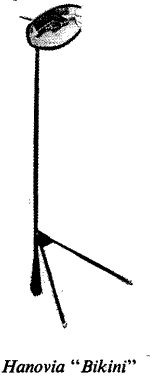 We're
told that the colonel cannot find an image to describe Mrs Assingham's speech,
but because the writing cannot proceed without one, James supplies one anyway:
he watches her "accordingly,
in her favourite element, very much as he had sometimes watched, at the Aquarium,
the celebrated lady who in a slight, though tight, bathing-suit, turned somersaults
and did tricks in the tank of water' (The Golden Bowl, p. 71). In his desire
to use any possible image, however unlikely, James acquires the perverse claustrophobia
of Seurat's late paintings. In both an obsession with exact observation split
the unit of recording - brushstroke or image - to an unparalleled degree. However,
the careful laying of chromatic contradictions did not finally achieve objectivity,
but instead created a world of burlesques, moving their stiff, fetishized limbs
round a small world most succinctly pictured as a brothel or boudoir circus,
with its repeated events of tawdry splendour and physical mastery and all its
laughable humiliations. Instead of blossoming into a new world of realism, the
rigorous pursuit of bourgeois naturalism finishes with a puppet world, of which
only psychoanalysis can guage the truth.
We're
told that the colonel cannot find an image to describe Mrs Assingham's speech,
but because the writing cannot proceed without one, James supplies one anyway:
he watches her "accordingly,
in her favourite element, very much as he had sometimes watched, at the Aquarium,
the celebrated lady who in a slight, though tight, bathing-suit, turned somersaults
and did tricks in the tank of water' (The Golden Bowl, p. 71). In his desire
to use any possible image, however unlikely, James acquires the perverse claustrophobia
of Seurat's late paintings. In both an obsession with exact observation split
the unit of recording - brushstroke or image - to an unparalleled degree. However,
the careful laying of chromatic contradictions did not finally achieve objectivity,
but instead created a world of burlesques, moving their stiff, fetishized limbs
round a small world most succinctly pictured as a brothel or boudoir circus,
with its repeated events of tawdry splendour and physical mastery and all its
laughable humiliations. Instead of blossoming into a new world of realism, the
rigorous pursuit of bourgeois naturalism finishes with a puppet world, of which
only psychoanalysis can guage the truth.
"She was like the kind lady who, happening to linger at the circus while the rest of the spectators pour grossly through the exits, falls in with the overworked little trapezist girl - the acrobatic support presumably of embarrassed and exacting parents - and gives her, as an obscure and meritorious artist, assurance of benevolent interest.' (The Golden Bowl, p. 5O3) Here James invokes the cosy world of Edward Ardizzone, where the infant reader observes the free floating of the child protagonist among adults with the same satisfaction that the child imagines its chosen fetish travelling the world, small slippery and omnipotent. The trappings of this delightful dolphin performance are the trapeze, nets and ropes of the circus, the penguin's hoop of real fire, the painted wooden tubs on which the beasts of creation - from elephant to poodle - are made to perch. The circus ring itself has vaginal associations: "encouraging thus the irruption of society, imitated the aperture through which the bedizened performers of the circus are poured into the ring" (The Golden Bowl, p. 494). One more specimen of the ubiquitous fuck in Henry James. The sexual charge in these cameotic reveries explains their knowing, arch collusion better than the assumption that circuses and apertures, leather integuments and suppression of pay, tanks of water and tight bathing suits are merely the self-evidently shared culture of James and his readers. So many of the objects James uses to image psychological twists and turns are novel commodities (like his subtleties of observation) - it is the pursuit of the apparatus of modern life into its unconscious eroticism that gives James' language its peculiar punch.
In describing James' prose the terms continual, persistent, ceaseless keep recurring: this is because, like all crucial imaginative literature, each sentence actually says the same thing (Joyce was so sure of that fact that he abolished the notion of having to write about anything at all). James writes about and through the fetish, the disembodied lump of human value which allows the circulation of sex and money and which by mediating exchange masks social relations, enabling capitalists to accumulate surplus value and men to think of sexuality as something that resides in objects.
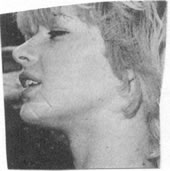 "A
man of decent feeling didn't thrust his money, a huge lump of it, in such a
way, under a poor girl's nose - a girl whose poverty was, after a fashion, the
very basis of her enjoyment of his hospitality - without seeing, logically,
a responsibility attached." (The Golden Bowl, p. 173). The succulence of this
particular sentence is only in part derived from its delicate charting of the
triple threat contained in the unleashed significatory "huge lump" (appearing
to demand enthusiastic oral sevices for itself in three guises - cock, excrement
and toes), and the way it touches on the memory of Justine's unhappy fate (also
a poor girl thrown on a man's hospitality) - it also derives its verve from
an ambiguous stance vis a vis the market economy. On the conscious level, with
its assertion of a "responsiblity attached", it would seem to sloganize versus
the destructive, inhuman atomism of the capitalist dynamic.
"A
man of decent feeling didn't thrust his money, a huge lump of it, in such a
way, under a poor girl's nose - a girl whose poverty was, after a fashion, the
very basis of her enjoyment of his hospitality - without seeing, logically,
a responsibility attached." (The Golden Bowl, p. 173). The succulence of this
particular sentence is only in part derived from its delicate charting of the
triple threat contained in the unleashed significatory "huge lump" (appearing
to demand enthusiastic oral sevices for itself in three guises - cock, excrement
and toes), and the way it touches on the memory of Justine's unhappy fate (also
a poor girl thrown on a man's hospitality) - it also derives its verve from
an ambiguous stance vis a vis the market economy. On the conscious level, with
its assertion of a "responsiblity attached", it would seem to sloganize versus
the destructive, inhuman atomism of the capitalist dynamic. 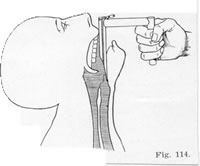 This
would relegate James to the kind of individualizing moralism that has ever inveighed
against the forces of production, hiding the fact that it is irrevocably tied
to the very capitalist relations of property it claims to reform - that would
finally rather shade the power of money in decent feeling than supersede it.
James' sentence is more true to the state of things than that. Successive interpolations
between "nose" and "responsibility" subvert the overt argument, bringing out
a sinister implication that the responsibility "seen" is the responsibility
of the poor girl - implying that she should reciprocate the man's hospitality
by sucking his cock, eating his excrement and kissing his feet (12). James'
negative
This
would relegate James to the kind of individualizing moralism that has ever inveighed
against the forces of production, hiding the fact that it is irrevocably tied
to the very capitalist relations of property it claims to reform - that would
finally rather shade the power of money in decent feeling than supersede it.
James' sentence is more true to the state of things than that. Successive interpolations
between "nose" and "responsibility" subvert the overt argument, bringing out
a sinister implication that the responsibility "seen" is the responsibility
of the poor girl - implying that she should reciprocate the man's hospitality
by sucking his cock, eating his excrement and kissing his feet (12). James'
negative  constructions
frequently create scenarios while appearing to deny them: they therefore resemble
pornography or tabloid sensationalism, where any account, whether documentary
or prescriptive, is fodder for arousal. James goes out of his way to depict
what the men of decent feeling DO NOT
DO, and details it with sadistic relish. [U] De Sade's black laughter bursts
beneath the elevated sentiments. James' unconscious evil is in truth more progressive
than de Sade's often fatuous reversals: it gives the lie to piety not by a facile
equation between power and money, but by concentrating on the inevitable universality
of exchange as the medium of problem and solution, the centrality of the fetish
in ideological representations of the relations between human beings. The sudden
irruption of mass-marketed commodities into the text just when it is at its
most abstract, fine and elevated reduces this fetish - prick or poodle, lump
or wafer, sex or object - to zero by exposing its dependence for meaning on
accidental structures, social and historical.
constructions
frequently create scenarios while appearing to deny them: they therefore resemble
pornography or tabloid sensationalism, where any account, whether documentary
or prescriptive, is fodder for arousal. James goes out of his way to depict
what the men of decent feeling DO NOT
DO, and details it with sadistic relish. [U] De Sade's black laughter bursts
beneath the elevated sentiments. James' unconscious evil is in truth more progressive
than de Sade's often fatuous reversals: it gives the lie to piety not by a facile
equation between power and money, but by concentrating on the inevitable universality
of exchange as the medium of problem and solution, the centrality of the fetish
in ideological representations of the relations between human beings. The sudden
irruption of mass-marketed commodities into the text just when it is at its
most abstract, fine and elevated reduces this fetish - prick or poodle, lump
or wafer, sex or object - to zero by exposing its dependence for meaning on
accidental structures, social and historical.
This tendency
was remarked in the employment of "vibration" at moments of intensity, where
a reference to sex aids achieved irreversible bathos. The short 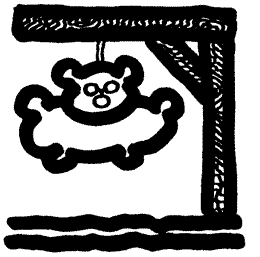 story
named "The Reverborator" makes it clear that James considered this effect essentially
modern, harsh and painful, but nevertheless illluminating. French still retains
this word, now archaic in English, as "réverbère", meaning a streetlamp
(it refers to the reflectors built into "modern" gas lamps) - providing the
thread for innumerable neophytic crystallizations, bridging as it does the desired
"raver" persona of the adolescent and the repressed (or ironically stressed)
teddy bear of infancy. Another comparable set of symptoms are unleashed by the
use of the word "elastic", which also has its counterpart in the degraded world
of mass production, with its corollary that the custodians of high art - shoring
up the pretence of an aura long after its demise in an era of mechanical reproduction
- find its mention irreparably deflating. Can the adjective "elastic" - as voiced
in, say, high-grade art history - avoid a degrading evocation of the twanging
commodity? In fact elastic as "cord or string, usually woven with india-rubber"
predates by six years the OED's example of elastic as adjective, which begs
the question why elastic as material should lack the status of linen or silk.
One explanation is its association with form-hugging articles of clothing which
lie next to the skin, like underwear and swimsuits. Although, unlike the Victorians,
we can now mention such things, it's at the cost of a certain seriousness antique
props appear to guarantee, however predictable and dull. The effect reading
"PANTS" in Coleridge's Kubla Khan in this way has already been pointed out (13).
Zappa used the anti-climactic operation of elasticity when he named his twenty
first record, brimming with extra-terrestrial encounters and alchemical mysteries,
One Size Fits All, measuring the grandeur of adolescent sci-fi imagination by
the boasts of clothing manufacturers. The "Sirens" chapter of Ulysses, ever
useful in charting the unconscious web of connections that structure conventional
notions of the relationship between music, freedom and desire, finds music in
the smack of an elastic garter on "her smackable woman's waemhosed thigh" (14).
The underlying reason for elastic's desecration of bourgeois profundity is not
only its intimation of the rag trade - actual source of realy bourgeois wealth
- but also the way it embarrasses the sexual repression mysticism relies on.
One of the characteristics of sexual organs - one which never ceases to astound
the positivist sense of order - is their elasticity, as here: "The reason was
- into which he had lived, quite intimately, by the end of a quarter of an hour
- that just this truth of their safety offered it now a kind of unexampled receptacle,
letting it spread and spread, but at the same time elastically enclosing it,
banking it in, for softness, as with billows of eiderdown.' (The Golden Bowl,
p. 227). This is unparalleled lyricism of penetration, a screw to which hours
of foreplay have prepared the way - the unconscious fucks in Henry James are
good fucks.
story
named "The Reverborator" makes it clear that James considered this effect essentially
modern, harsh and painful, but nevertheless illluminating. French still retains
this word, now archaic in English, as "réverbère", meaning a streetlamp
(it refers to the reflectors built into "modern" gas lamps) - providing the
thread for innumerable neophytic crystallizations, bridging as it does the desired
"raver" persona of the adolescent and the repressed (or ironically stressed)
teddy bear of infancy. Another comparable set of symptoms are unleashed by the
use of the word "elastic", which also has its counterpart in the degraded world
of mass production, with its corollary that the custodians of high art - shoring
up the pretence of an aura long after its demise in an era of mechanical reproduction
- find its mention irreparably deflating. Can the adjective "elastic" - as voiced
in, say, high-grade art history - avoid a degrading evocation of the twanging
commodity? In fact elastic as "cord or string, usually woven with india-rubber"
predates by six years the OED's example of elastic as adjective, which begs
the question why elastic as material should lack the status of linen or silk.
One explanation is its association with form-hugging articles of clothing which
lie next to the skin, like underwear and swimsuits. Although, unlike the Victorians,
we can now mention such things, it's at the cost of a certain seriousness antique
props appear to guarantee, however predictable and dull. The effect reading
"PANTS" in Coleridge's Kubla Khan in this way has already been pointed out (13).
Zappa used the anti-climactic operation of elasticity when he named his twenty
first record, brimming with extra-terrestrial encounters and alchemical mysteries,
One Size Fits All, measuring the grandeur of adolescent sci-fi imagination by
the boasts of clothing manufacturers. The "Sirens" chapter of Ulysses, ever
useful in charting the unconscious web of connections that structure conventional
notions of the relationship between music, freedom and desire, finds music in
the smack of an elastic garter on "her smackable woman's waemhosed thigh" (14).
The underlying reason for elastic's desecration of bourgeois profundity is not
only its intimation of the rag trade - actual source of realy bourgeois wealth
- but also the way it embarrasses the sexual repression mysticism relies on.
One of the characteristics of sexual organs - one which never ceases to astound
the positivist sense of order - is their elasticity, as here: "The reason was
- into which he had lived, quite intimately, by the end of a quarter of an hour
- that just this truth of their safety offered it now a kind of unexampled receptacle,
letting it spread and spread, but at the same time elastically enclosing it,
banking it in, for softness, as with billows of eiderdown.' (The Golden Bowl,
p. 227). This is unparalleled lyricism of penetration, a screw to which hours
of foreplay have prepared the way - the unconscious fucks in Henry James are
good fucks.
The balance of
James' sentences, the quick economy of exchange and contrast, is conducted with
a pleasure for order and ritual that exceeds that required by logic. The fetishistic
aspect of elasticated garments is quickly recruited to clothe the participants
in these poignant little games: "They've mainly known "old England" as a shop
for articles in india-rubber and leather, in which they've dressed themselves
as much as possible." (The Golden Bowl, p. 44).  This
sensitivity to the sex-appeal of the inorganic, especially in relation to rubber
and leather, opens up in symbolic form an erotics of the contrast between inside
and outside (a dialectic which "normal" sexuality, with its emphasis on the
two rims of the digestive tract, mouth and anus, already contains) - rubber
and leather being chosen for their impermeability, their closure, at the opposite
pole from the open weave and flesh-flashing tears of the victim's flimsy cotton
shift, through which urine and saliva, blood and tears may easily flow. "The
weight of it, settling on my shoulders is reassuring. Once I zip it, turn the
collar up and cram my hands into the pockets, the jacket is my armour" (15).
One Size Fits All dramatizes the impermeable surface of the fuzzed heavy metal
guitar, likening it to the surfaces of both the skin and the earth's crust:
the hegelian distinction between superficial phenomena and the abstract idea
invokes a similar sexual contrast. In James, this contrast applies to the workings
of anxious psychology and the dissection of motive, where molecular analysis
would seem to pull the inner operation of the human mind from its individual
skin: this extraction comes as an erotic release, like the flashbulb of orgasm
in Burroughs when the anima of the body can be whisked away and inserted into
another body. The leather integument becomes an assurance that the individual
will survive: the pail in which the slop of pulverised inner impulses may be
given a name and a number. In James, the victim's inelastic gear protects his
body from the blows of his captor: "His good nature checked his resenting the
young minister's lofty admonitions and his tough, inelastic sense of humour
forbade his taking them seriously." (The American, p. 65). Checked and translated,
this sadomasochistic exchange surfaces in the obedient awe of "lofty admonitions"
and the unnecessarily palpable concept of humour as "tough and inelastic" brings
on the image of some heavyduty restrictive device, preferably made of animal
hide.
This
sensitivity to the sex-appeal of the inorganic, especially in relation to rubber
and leather, opens up in symbolic form an erotics of the contrast between inside
and outside (a dialectic which "normal" sexuality, with its emphasis on the
two rims of the digestive tract, mouth and anus, already contains) - rubber
and leather being chosen for their impermeability, their closure, at the opposite
pole from the open weave and flesh-flashing tears of the victim's flimsy cotton
shift, through which urine and saliva, blood and tears may easily flow. "The
weight of it, settling on my shoulders is reassuring. Once I zip it, turn the
collar up and cram my hands into the pockets, the jacket is my armour" (15).
One Size Fits All dramatizes the impermeable surface of the fuzzed heavy metal
guitar, likening it to the surfaces of both the skin and the earth's crust:
the hegelian distinction between superficial phenomena and the abstract idea
invokes a similar sexual contrast. In James, this contrast applies to the workings
of anxious psychology and the dissection of motive, where molecular analysis
would seem to pull the inner operation of the human mind from its individual
skin: this extraction comes as an erotic release, like the flashbulb of orgasm
in Burroughs when the anima of the body can be whisked away and inserted into
another body. The leather integument becomes an assurance that the individual
will survive: the pail in which the slop of pulverised inner impulses may be
given a name and a number. In James, the victim's inelastic gear protects his
body from the blows of his captor: "His good nature checked his resenting the
young minister's lofty admonitions and his tough, inelastic sense of humour
forbade his taking them seriously." (The American, p. 65). Checked and translated,
this sadomasochistic exchange surfaces in the obedient awe of "lofty admonitions"
and the unnecessarily palpable concept of humour as "tough and inelastic" brings
on the image of some heavyduty restrictive device, preferably made of animal
hide.
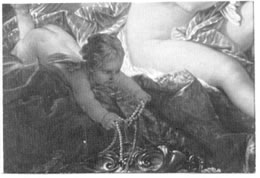 The
drift is towards the apparatus of perversion, but that is not to deny the act
of penetration it appears to run from. The fetish is anchored in castration
fear and speculation, but to put it at the centre of signification is not to
glorify the physical possessors of the penis or to denigrate the female, though
these structures will undoubtedly be manipulated in the interests of capital,
for the smooth running of patriarchy, to sell margarine. What is fetishized
cannot be an action: it is an object. And the object for play - presence or
absence, fearful constriction and disbelieving definition - is unconsciously
phallic. Only by bringing the phallic substructure of exchange to consciousness
can the effective imagery of late capitalism be explained, can the real connections
between the "degradation" and "objectification" of women in pornography and
advertising and the commodity be understood, its play on male fear and inadequacy
and exclusion (rather than on megalomania) be clarified.
The
drift is towards the apparatus of perversion, but that is not to deny the act
of penetration it appears to run from. The fetish is anchored in castration
fear and speculation, but to put it at the centre of signification is not to
glorify the physical possessors of the penis or to denigrate the female, though
these structures will undoubtedly be manipulated in the interests of capital,
for the smooth running of patriarchy, to sell margarine. What is fetishized
cannot be an action: it is an object. And the object for play - presence or
absence, fearful constriction and disbelieving definition - is unconsciously
phallic. Only by bringing the phallic substructure of exchange to consciousness
can the effective imagery of late capitalism be explained, can the real connections
between the "degradation" and "objectification" of women in pornography and
advertising and the commodity be understood, its play on male fear and inadequacy
and exclusion (rather than on megalomania) be clarified.
Penetration is one transaction among others in James. It is neither given the christian-sexist seal of approval as the only legitimate sexual act, nor is it rejected in the manner of MacCabe's ideological inversion. At the same time, the fetish becomes relentlessly phallic, whether it starts out as sex object, art object, foot or golden bowl. The confusion between female body and phallus (16) can be seen as a device squeezed out of language in James. The visual motifs of SM are so dazzling there is a tendency to situate the original sin in looking and showing alone. This tendency is encouraged by the "scientific" status of photographic recording compared to verbal description, a fallacy buttressed by the law which has made visual images the subjects of the most obvious bans. The importance accorded the visual as more "objective" than language reinforces the primacy of the visual in a generalized concealment of power under capitalism. The nineteenth century novel rendered language irretrievably opaque. Television Dickens forces acknowledgment of class in accent and choice of words: the one area of safe, classless semiotic manipulation was visual, in particular in pursuit of The Sexy. This might seem to imply Fredric Jameson's theory of the hidden utopian moment in all ideology, its longing for a social system beyond class (17), but to applaud this moment AS IT IS is merely to succumb to ideology. Of course for the marxist there is no retreat into the homespun securities of petit-bourgeois affection, "back to tweaking tits and munching cunt in the dark" (15); it is the changes wrought sex by technology which can reclaim it for those it exploits. Here the forces of production have been intensely mobilized, with the minutely divided specializations of model agencies and graphic design schools. The ubiquity of religious imagery was replaced, with soul destroying efficiency. To attempt to ban these images merely colludes in their effectiveness, when it is precisely this that needs undermining. To take these great airbrushed swathes of flesh, their continual flirtation with fetishistic reference, the inevitable phallic reliance burning with such laughable deflation out of them, and to find their flopping tensions and leashed aggressions prefigured in James' precious turns of phrase; to take these pneumatic pop-ups back into words - such amoeuvres challenge the simplicity of effect pornography pretends to, undermines the "truth" ideology's images have laid on us since power learnt their use. Iconoclasm physically destroys the icon because it still believes in the fetish, believes in its power more than it believes in the power of human beings to change the world they've created. It is precisely to interrupt the dingdong of ideologically colluding "opposition" that poodle play was invented.
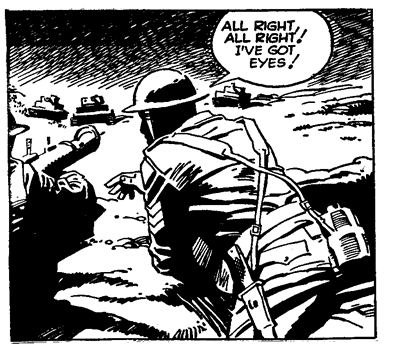 The
erotic nature of uniform, most famously regimented by Hitler and best analysed
by Wilhelm Reich (18) is relentlessly exploited by the right. Finding the overt
sensuality of the Gestapo outfit somewhat un-English, advertising prefers to
heark on camouflage and khaki. Such references to the Forces supply a wholesome
chumminess needed to prevent the exploited SM currents becoming conscious, nevertheless
invoking an existent world of violence and discipline. The simultaneous danger
and comfort, sex and order in the softcore pin-up - she may be wearing satin
suspenders but she's eighteen and likes collecting stamps - is perfect preparation
for the titillations of reading about England at war. The Sun managed to combine
its two enthusiasms together in a front page featuring a regiment's pin-up during
the Falklands War. This was in fact a return to the origins of the pin-up, originally
designed as wankfodder for American troops in the Second World War. In times
of "peace", rape/sex-crime reporting (and sex is only reported when it interferes
with bourgeois property relations, acts themselves being unlovely to ideology)
perpetuates the combination of arousal and traditional morality that can hold
the eye while wagging the finger at the imagination.
The
erotic nature of uniform, most famously regimented by Hitler and best analysed
by Wilhelm Reich (18) is relentlessly exploited by the right. Finding the overt
sensuality of the Gestapo outfit somewhat un-English, advertising prefers to
heark on camouflage and khaki. Such references to the Forces supply a wholesome
chumminess needed to prevent the exploited SM currents becoming conscious, nevertheless
invoking an existent world of violence and discipline. The simultaneous danger
and comfort, sex and order in the softcore pin-up - she may be wearing satin
suspenders but she's eighteen and likes collecting stamps - is perfect preparation
for the titillations of reading about England at war. The Sun managed to combine
its two enthusiasms together in a front page featuring a regiment's pin-up during
the Falklands War. This was in fact a return to the origins of the pin-up, originally
designed as wankfodder for American troops in the Second World War. In times
of "peace", rape/sex-crime reporting (and sex is only reported when it interferes
with bourgeois property relations, acts themselves being unlovely to ideology)
perpetuates the combination of arousal and traditional morality that can hold
the eye while wagging the finger at the imagination.  The
institution of the majorette recruits the swoon of love to the necessity for
soldiers to die for the imperialist ambitions and electoral poise of their ruling
class: "he had affection for the feudal machinery and desired nothing better
than that it should crush him - a common wish of the human adorer whether he
cast himself under a Juggernaut or pray God with tears of affection to mortify
him or swoon under the hand of his mistress."(19) Joyce here registered surrender
to outmoded relations of production as an act made sweet by association with
sexual release. Militarism exploits similar currents in order to make death
palatable to those it martials. Of course we get nowhere by bluntly condemning
the masochistic impulse, moral strictures being a method of accumulating power
in the hands of moralizers - from bishops to the WAVAW (Women Against Violence
Against Women) hacks in the Labour Party - rather than in the hands of those
who live and die according to the dictates of capital, the working class.
The
institution of the majorette recruits the swoon of love to the necessity for
soldiers to die for the imperialist ambitions and electoral poise of their ruling
class: "he had affection for the feudal machinery and desired nothing better
than that it should crush him - a common wish of the human adorer whether he
cast himself under a Juggernaut or pray God with tears of affection to mortify
him or swoon under the hand of his mistress."(19) Joyce here registered surrender
to outmoded relations of production as an act made sweet by association with
sexual release. Militarism exploits similar currents in order to make death
palatable to those it martials. Of course we get nowhere by bluntly condemning
the masochistic impulse, moral strictures being a method of accumulating power
in the hands of moralizers - from bishops to the WAVAW (Women Against Violence
Against Women) hacks in the Labour Party - rather than in the hands of those
who live and die according to the dictates of capital, the working class.
In Henry James,
such issues reach grammatical concentration in this sentence: "She stood there,
in her full uniform, like some small erect commander of a seige." (The Golden
Bowl, p. 463). Like any pin-up, this is to make the woman's body phallic, but
it makes other strange comparisons besides: a seige is an encirclement and hence
a vagina. Though the sense of the image makes what is standing small and erect
its commander, it hints that it is the lonely outpost that is itself under seige.
James' images can arrive out of the geometrical sexual detritus of the child's
distracted interpretation of history lessons, when seiges, battering rams and
assegai, the coracle of the celt and the beard of the king of Spain become part
of a magico-sexual constellation on which the unconscious performs acts of startling
density and dexterity, while the conscious mind "suffers" from "boredom". 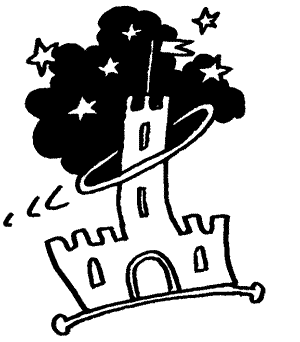 Here
the idea of the seige-noose tightening on the castle-neck, the gradual starvation
of the inhabitants, is being likened to the dangers lurking in the depths of
penetration, the slow crumbling of shiny monuments; aftersex experienced as
clean ruins of weathered brick and stone, the trim green lawns of the kindly
National Trust. The apparatus of sexual perversion is basically the metaphorical
one of allowing one thing to stand for another; it is no surprise, then, that
the super-metaphorical constructions of James' late writings should provide
blueprints for this apparatus. Reassurance like the above is intended to provide
relief from the anxiety which correspondence inevitably provokes in the commonsense
mind. For the thirsty, the signs of the oasis - palm tree, shiny water, twinkling
star - are comfort, however hackneyed. Devoid of concrete political proposal,
all theory is consolation. Poodle play would argue out theory on the hoof as
befits the satanic nature of a dialectic cloven by a dark and destructive tradition.
The theory that is glimpsed at a gallop does not count heads, it's a free-wheeling
application of Marx and Freud. At times analyses may be punned together in terms
like fetish and repression, production or consciousness. Such coalescence is
however specific, and is only to be trusted in the explication of the particular
item. For poodle play to inveigh against surprise is hence a callous trick -
it ever seeks the shock marxist and freudian insights convey when they aren't
won to bourgeois revision-and-comfort systems.
Here
the idea of the seige-noose tightening on the castle-neck, the gradual starvation
of the inhabitants, is being likened to the dangers lurking in the depths of
penetration, the slow crumbling of shiny monuments; aftersex experienced as
clean ruins of weathered brick and stone, the trim green lawns of the kindly
National Trust. The apparatus of sexual perversion is basically the metaphorical
one of allowing one thing to stand for another; it is no surprise, then, that
the super-metaphorical constructions of James' late writings should provide
blueprints for this apparatus. Reassurance like the above is intended to provide
relief from the anxiety which correspondence inevitably provokes in the commonsense
mind. For the thirsty, the signs of the oasis - palm tree, shiny water, twinkling
star - are comfort, however hackneyed. Devoid of concrete political proposal,
all theory is consolation. Poodle play would argue out theory on the hoof as
befits the satanic nature of a dialectic cloven by a dark and destructive tradition.
The theory that is glimpsed at a gallop does not count heads, it's a free-wheeling
application of Marx and Freud. At times analyses may be punned together in terms
like fetish and repression, production or consciousness. Such coalescence is
however specific, and is only to be trusted in the explication of the particular
item. For poodle play to inveigh against surprise is hence a callous trick -
it ever seeks the shock marxist and freudian insights convey when they aren't
won to bourgeois revision-and-comfort systems.
James' association
with the ruling class in England infused his language with the "respect for
the opposition" that characterizes liberal politics: British officers entertaining
their Argentinian counterparts to banquets after their soldiers have been blowing
each other apart; MPs sitting together in the House, civil exchanges whatever
the state of the class war.  Liberalism
steeps itself in the sterile equivalence of the mirror: the actual dynamics
of holding onto power under capitalism are concealed by the presentation of
a balance between two equally logical (and because they're merely "logical",
equally disastrous) alternatives. There is in this a profound antipathy to thought
itself, whose material findings are ever assymmetrical, unbalanced and knobbly.
The equivalence of the mirror, a parody of dialectics, is used to blot out real
issues, and the Daily Mail denounces Anti-Nazi League demonstrators as "red
Fascists", while academics talk of "right" and "left" "communities" in pre-coup
Chile. (20) This strategy is not simply improvised at the prospect of mass movements
which threaten the decision-making processes that guarantee the capitalist order;
it informs the very basis of the decision-making processes themselves. Acquiescence
to a social order justified in political terms by the equivalence of opposites
is not won by appeal to the conscious experience of the working class - but
to unconscious knowledge of the mutuality in sadomasochism. In the radically
subjective world of infantile wishes and dreams, every act is lovely because
their is no division between persons. I am both murderer and victim. Good sex
reaches that point, sadomasochism charts its limits. The error of apocalyptical
enthusiasm is to project this condition onto the world as it is, to mystify
war and genocide as parts of some divine order, nightmares for the world soul
(21) - instead of the blatant danger it is for particular individuals. It is
of little use to preach "respect for the individual" to the wild pre-individualist
ravings of the sadomasochistic imagination; better to see prefigured in them
the utopia of a world in which the knot of the private, competing individual
has been untied, the promise Adorno perceived in Wagner, that "contained in
the age-old protest of MUSIC: the promise of a life without fear" (22).
Liberalism
steeps itself in the sterile equivalence of the mirror: the actual dynamics
of holding onto power under capitalism are concealed by the presentation of
a balance between two equally logical (and because they're merely "logical",
equally disastrous) alternatives. There is in this a profound antipathy to thought
itself, whose material findings are ever assymmetrical, unbalanced and knobbly.
The equivalence of the mirror, a parody of dialectics, is used to blot out real
issues, and the Daily Mail denounces Anti-Nazi League demonstrators as "red
Fascists", while academics talk of "right" and "left" "communities" in pre-coup
Chile. (20) This strategy is not simply improvised at the prospect of mass movements
which threaten the decision-making processes that guarantee the capitalist order;
it informs the very basis of the decision-making processes themselves. Acquiescence
to a social order justified in political terms by the equivalence of opposites
is not won by appeal to the conscious experience of the working class - but
to unconscious knowledge of the mutuality in sadomasochism. In the radically
subjective world of infantile wishes and dreams, every act is lovely because
their is no division between persons. I am both murderer and victim. Good sex
reaches that point, sadomasochism charts its limits. The error of apocalyptical
enthusiasm is to project this condition onto the world as it is, to mystify
war and genocide as parts of some divine order, nightmares for the world soul
(21) - instead of the blatant danger it is for particular individuals. It is
of little use to preach "respect for the individual" to the wild pre-individualist
ravings of the sadomasochistic imagination; better to see prefigured in them
the utopia of a world in which the knot of the private, competing individual
has been untied, the promise Adorno perceived in Wagner, that "contained in
the age-old protest of MUSIC: the promise of a life without fear" (22).
These observations
are not without consequence in the practical measures we might take to indeed
create a real life without fear for people on this planet. The vulgar feminist
notion of sex as violence against women (as sprayed up on various hoardings
advertizing durex in Yorkshire as of this writing), like the Prudhonist concept
of a simple opposition between rich and poor, precludes any conscious political
solution. It accepts reactionary categories instead of examining how they are
produced. 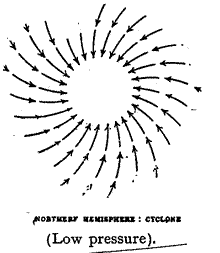 Masochism
arises from turning libido and aggression inward, following the incalcation
that you must do as you would be done - the irony being, that instead of loving
others, the child starts to hate itself. The equivalence of opposites in sadomasochism,
the libido's equal investment in both roles, may prefigure a world beyond fear,
but it serves to mystify contradiction in the present world. The stress on the
sexual throughout the media is an end result of competition for attention, but
its net effect, the induction of sexualized stupour, stymies critical action.
The persistent association of sex with violence serves to create a mistrust
of the sexual impulse itself, a fear of lust which is excellently prepared to
remove confidence and lower expectation. In this schema, sexism would be the
false solution in which a social concept of power is used to replace sexual
longing, where imposition on women is misconceived as a reinstatement of the
lost status suffered in self-hatred. In James, the libidinal tendency to want
both options of a binary choice - used by the media to equate political opposites,
and to moralize equally against both - is tuned to a fine pitch: "and would
probably like the loose slippers of blamelessness quite as well as the high
standards of the opposite camp" (The Tragic Muse, p. 2l5).
Masochism
arises from turning libido and aggression inward, following the incalcation
that you must do as you would be done - the irony being, that instead of loving
others, the child starts to hate itself. The equivalence of opposites in sadomasochism,
the libido's equal investment in both roles, may prefigure a world beyond fear,
but it serves to mystify contradiction in the present world. The stress on the
sexual throughout the media is an end result of competition for attention, but
its net effect, the induction of sexualized stupour, stymies critical action.
The persistent association of sex with violence serves to create a mistrust
of the sexual impulse itself, a fear of lust which is excellently prepared to
remove confidence and lower expectation. In this schema, sexism would be the
false solution in which a social concept of power is used to replace sexual
longing, where imposition on women is misconceived as a reinstatement of the
lost status suffered in self-hatred. In James, the libidinal tendency to want
both options of a binary choice - used by the media to equate political opposites,
and to moralize equally against both - is tuned to a fine pitch: "and would
probably like the loose slippers of blamelessness quite as well as the high
standards of the opposite camp" (The Tragic Muse, p. 2l5).
Here various oppositions are created which undoubtedly structure desire, but between which the ardent fetishist would hardly want to choose for life:
LOOSE SLIPPERS <-----> TIGHT BOOTS
M <-----> S
ANUS <-----> VAGINA
The pun on "standards" draws out the military trappings of all hierarchy, as James' later usage of the word "camp" indicates the sexual pretence of all costume. The see-saw turns on blamelessness versus camp, bum versus cunt, Dora versus Dinah. (23) Desire, purposelessness, dirt and lowness versus duty, purpose, cleanliness and elevation. The slippery associations of buggery - "putting butter on the doorknob to stop the children" - come out in "slippers", as well as the degradation of Fido who is sent to fetch them - reminding us that rear entry "which Brant"me calls `more canino' had been denounced from the early Middle Ages as lowering man to the level of the animal". (24) The "high standards of the opposite camp" in their turn seem to propose the thigh boots of high camp, the strict discipline of the dutiful fuck, the erect penis refered to in the goose-step. "As well" - think of lowering the bucket to the dark, echoic water - opens up the subjective depths of happy penetration. When choice is posed in the form of various sexual practices, the unconscious impulse is to eat down contradiction whole. Ideology uses this response to make all opinion equivalent and powerless.
The materialist baulks at the choices on display in the social democratic megastore, attempting instead to bring the attractions and repulsions of each to consciousness so they might throw into relief the real limitations of the trash on offer. The Daily Mail equates all revolt with sexual disorder: political "extremism" of every hue offers the same opportunity for the pursuit of irresponsible, selfish impulse. Now that class conflict is obscured, fascism may be ushered in through the back door: to operate its compromise with the order it has itself unsettled by overstress and to propose measures to deal with "racial conflict" it has itself stagemanaged. Conscious pursuit of the sexual pleasures hinted at darkly by those who would refer you to-the equivalence of opposites deprives them of their trump card, the commonsense that connects sexual pleasure with disaster.
James' contrast between slippers and standards encapsulates the dilemma in The Tragic Muse between bohemian laxity and dutiful service: it is in fact no choice at all. As Devo put it:
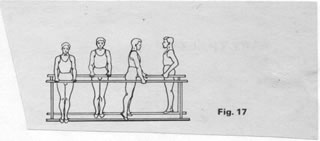
Freedom of choice, that's what you get
Freedom from choice, that's what you want
Concentration on desire bursts through the twee offers of ideology - cheese & onion or salt 'n vinegar - as surely as revolutionary politics. The choice in James is no choice at all, but a neverending sexual piquancy created through polarity, where the existence of one extreme guarantees the other. Thigh boots or slippers, man or woman, the Marquis de Sade or Sacher Masoch, fuckery or buggerdom, the pig or the poke. At the end of the day, the officer kicks off his jackboots and pulls on his slippers - but this doesn't mean that wearing slippers all day is an effective act of anti-militarism. The revolutionary moment goes beyond personal pleasure and choice, which remain locked on the level of the symbolic, it is constituted by action on the world which knows itself as action. Symbols are then exposed as myth. This is of course anathema to the petitbourgeois magicians of structuralism who have never seen the results of working on the world. The sun comes out, I put down the shovel and I'm shattered. They want to deliver us all to a world of helpless surface scribbling like theirs. Workers may only see the fruits of their labour in alienation, but they nevertheless know that it is human work that makes the world, so human work can transform it. Poodle play would use psychoanalysis to understand the misdirections of ideology, to understand how the mode of thought of one class is foisted on another - what we don't need is psychoanalysis as a species of rarified Which? magazine, helping us make better choices in the terms laid down for us, advising us to renounce penetration, eat beans, stammer, scribble and dribble, and then vote Labour.
James sees beyond
the limitations of choice, even if he cannot develop a political dimension to
this disgust with liberal tweenitosis. In The Tragic Muse, he satirizes Peter's
justification for desiring Miriam: "She carried his imagination off into infinite
spaces, whereas she carried Dashwood's only into the box-office and the revival
of plays that were barbarously bad." (The Tragic Muse, p. 341). This is petit-bourgeois
competition - self versus other - dressed up as the war between aesthete and
philistine.  James'
imagery invites our cynicism: Peter's preference is for sex personally experienced
over observing other people at it. We can sympathise with Peter's higher estimation
of carrying his own organ into "infinite" spaces to merely watching Basil's
being "boxed", but James' imagery exposes rebel aestheticism as conventional
sexual egoism.
James'
imagery invites our cynicism: Peter's preference is for sex personally experienced
over observing other people at it. We can sympathise with Peter's higher estimation
of carrying his own organ into "infinite" spaces to merely watching Basil's
being "boxed", but James' imagery exposes rebel aestheticism as conventional
sexual egoism.
James' phrases roll like slogans off the page, prompting summary by initial letters, raising the expectation that we are looking at unfurled mnemonic cryptograms. Usually in fact this is not the case. The above prompts the equation: "his I off into IIS vs D into BO, RP and BB". To proceed with these observations risks accusations of mixing alchemical irrationalism with hack practical criticism, but attention to detail must be rescued from practical criticism's tendency to puerile praise, as well as its positivist pretence to proceed from the particular to the universal, hiding the transactions of infantile sex play under bourgeois admiration for aptness and balance. (25) Note how these initials weigh repeated I's on Peter's side versus letters suggesting Body Odour, Rape and Bed & Breakfast on Basil's - all insisting on less pleasant versions of sexual encounter than Peter's plurality of egos. The issue on which the sentence hangs is the fuck, the inevitable investment of egoistic specificity in a physical act. The materialist knows that what is infinite in sex is not the subjective sensation of fucking (though we're not putting that down), but the eruption of the specific into what has been hitherto transacted in abstractions. Such "intellectual" vocabulary is necessary, not in order to waste the appetite of vivid sex talk, but in order to interrupt the conventional aphasia before the infinitudes of orgasm, behind which lurks bourgeois reverence for feeling - in order to propose that everything is really up for discussion.
 "I
enjoy going on stage and improvising a guitar solo. You know, you can't do that
at home. You can sit around and noodle on your guitar but it's the instant challenge
of going against the laws of physics and the laws of gravity and going on stage
and playing something nobody ever heard before. And nobody would dare to play.
That's what I like to do. That's . . . I mean, that's sex. It's better than
sex. That takes you into a realm of science." (26) Which is of course a logical
extension of the basic sex-contingency of the blues, which runs:
"I
enjoy going on stage and improvising a guitar solo. You know, you can't do that
at home. You can sit around and noodle on your guitar but it's the instant challenge
of going against the laws of physics and the laws of gravity and going on stage
and playing something nobody ever heard before. And nobody would dare to play.
That's what I like to do. That's . . . I mean, that's sex. It's better than
sex. That takes you into a realm of science." (26) Which is of course a logical
extension of the basic sex-contingency of the blues, which runs:
I woke up this mornin' - CONSCIOUSNESS
Met a girl walkin' down the street - SEX/CONTINGENCY
Now I'm lonely as a man can be - NEGATION OF THE NEGATION
(TIME'S ARROW, OR "MORAL")
In the sexist
environment of patriarchal family relations, women might well find that the
CESSATION of sexual encounters might constitute a surprise - I am attempting
to theorize the subjective experience of desire, not the miseries of harassment.
Bourgeois feminism, which sloganizes for the rights of the individual woman,
has a distaste for supersession of the individual in either political or psychological
terms: Spare Rib's refusal to admit the need for class solidarity ("across sex
lines") if women's strikes are to be won; the immediate assumption that desires
"beneath" individual consciousness betoken rape and pillage. There is of course
a legacy of socialist and surrealist motifs that does little to allay these
suspicions, but it is no solution to retreat to the securities of separatist
utopianism and/or reformism. The individual will that is subverted by the arrival
of the sex option is continually recuperated into teleological success by narrative
(the "moral" that caps a Blues), but that's not to devalue the original subversion.
Even if the concrete example of the blues, while sealing the association between
sex, chance and specificity, takes us into dodgy realms of actual sexual experience
under patriarchy, with potential celebration of sexual harassment and heterosexism
(the perils of cultural analysis: the reactionary character of all past secretions),
it still leads to a definition of sex more workable than bourgeois mystifications
about the inexpressible infinities of sexual sensation.  James'
opposition between infinity and box-office is an accurate sexual focus; the
supersessive image being that of the infinite box-office, where, instead of
an ideological choice between private daydreams and stunted reality, capitalist
pre-history is revealed as the dress rehearsal it is, and play becomes real.
This would entail the abolition of the abstract distinction between subjective
and objective in a post-revolutionary environment become completely contingent
and hence post-possessive. Hans Richter claimed the rediscovery of contingency
as the primary achievement of Dada. It's true that only a modernist, post-dada
aesthetic can gauge the subversion black music has inflicted on the abstractions
of the western tradition.
James'
opposition between infinity and box-office is an accurate sexual focus; the
supersessive image being that of the infinite box-office, where, instead of
an ideological choice between private daydreams and stunted reality, capitalist
pre-history is revealed as the dress rehearsal it is, and play becomes real.
This would entail the abolition of the abstract distinction between subjective
and objective in a post-revolutionary environment become completely contingent
and hence post-possessive. Hans Richter claimed the rediscovery of contingency
as the primary achievement of Dada. It's true that only a modernist, post-dada
aesthetic can gauge the subversion black music has inflicted on the abstractions
of the western tradition.
James is capable
of simpler versions of the sex act - and the negative dialectics of poodle play
will be quite capable of making the whole history of the world revolve round
them too: "`Ah bien, c'est tap‚ !' Miriam cried, as she stood before the easel.
Nick was pleased with her ejaculation, he was even pleased with what he had
done, he had had a long, happy spurt and felt excited and sanctioned." (The
Tragic Muse, p. 284) Here James charmingly (and unconsciously) reiterates the
Victorian myth that emission accompanies orgasm in the female. The tears of
crying merge with the easy grease of "easel" to provide ectoplasmic lubrication
for their mutual climax. We have already remarked on the way James' choice of
words - in the case above, "camp" - anticipate degraded sexual applications;
here "happy spurt" burns with awkward sex implications. 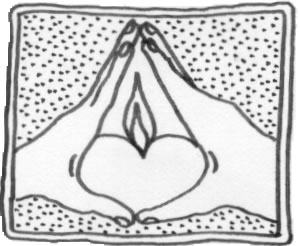 Take,
for example, this anticipation of the manual cunt sign of the feminists: "Maggie
came or with her heart in her hands; she came on with the definite prevision,
throbbing like the tick of a watch, of a doom impossibly sharp and hard, but
to which, after looking at it with her eyes wide open, she had none the less
bowed her head." (The Golden Bowl, p. 463). The sentence anticipates the numerological,
wobbly-brushstroke images of hippie art - the covers of Incredible String Band
records - with its image of eye heart and sexually expectant vagina all superimposed
(all it needs is an onion). Cyclops couldn't expect a surer penetration.
Take,
for example, this anticipation of the manual cunt sign of the feminists: "Maggie
came or with her heart in her hands; she came on with the definite prevision,
throbbing like the tick of a watch, of a doom impossibly sharp and hard, but
to which, after looking at it with her eyes wide open, she had none the less
bowed her head." (The Golden Bowl, p. 463). The sentence anticipates the numerological,
wobbly-brushstroke images of hippie art - the covers of Incredible String Band
records - with its image of eye heart and sexually expectant vagina all superimposed
(all it needs is an onion). Cyclops couldn't expect a surer penetration.
Doom, as euphemism for cock, might cause some surprise. Take this example from The Bostonians (p. 11O): "while the poor young man, unconscious of his doom, remarked that he hoped she wasn't going to exercise any influence that would prevent Miss Tarrant from taking the rank that belonged to her.' The original meaning of doom is that which is "put" or "set up": in this context Basil is indeed unaware of his sex - he underrates Olive's hostility to men, the extent to which she will indeed use her influence to prevent Verena marrying. Doom would therefore be eligible for phallic overtones: etymologically it carries the meaning of law or statute, and it is the operation of ideology that has projected it from manmade legal status to its presentday resonance as ineluctable and cosmic (doom occupies a similar place to the name of the father in the Lacanian pantomime). "To miss our doom" would represent a feminizing of patriarchal destiny with possibilities of liberation belied by its tone of resignation. (27)
Words are not
exhausted by their attested etymological history, they gain force and currency
through mistaken readings, similarities with other words, all kinds of irrational
extrapolation and comparison.  Thus
"pert" and "impertinent" come to mean the same thing, although the "pert" in
"impertinent" derives from the "pert" of "pertain" which means to belong, a
closure which contradicts "pert" which derives from "apertus", the Latin for
open. In the dictionary, the sole overlap between "pert" and "impertinent" is
found in the word "saucy", which explains the barely audible aside "makes its
own sauce, just add water" that introduces the title track of Joe's Garage.
That record's epic moment is supplied by "Wet T-Shirt Nite", which is all about
erect nipples; though the nipples are never actually described as "pert", this
is hinted at in the line "their ninnies get rigid and look pretty bold" - both
"bold" and "pert" being referred to anatomy from the vocabulary of social interaction,
offensive because it reads character into an involuntary physical reflex when
the progressive perview would rather read involuntary reflex into "character",
explode the reified categories of social life by interpreting them as effects
of structure.
Thus
"pert" and "impertinent" come to mean the same thing, although the "pert" in
"impertinent" derives from the "pert" of "pertain" which means to belong, a
closure which contradicts "pert" which derives from "apertus", the Latin for
open. In the dictionary, the sole overlap between "pert" and "impertinent" is
found in the word "saucy", which explains the barely audible aside "makes its
own sauce, just add water" that introduces the title track of Joe's Garage.
That record's epic moment is supplied by "Wet T-Shirt Nite", which is all about
erect nipples; though the nipples are never actually described as "pert", this
is hinted at in the line "their ninnies get rigid and look pretty bold" - both
"bold" and "pert" being referred to anatomy from the vocabulary of social interaction,
offensive because it reads character into an involuntary physical reflex when
the progressive perview would rather read involuntary reflex into "character",
explode the reified categories of social life by interpreting them as effects
of structure.
This does not mean that the progressive perview must respect the integral personality which is somehow sullied by being reduced to a pert nipple: "I am not convinced by arguments that the sexual response should only be provoked by "the whole person" and I have yet to hear a convincing argument as to why it is wrong to gain pleasure from representations of bodies or even "snatches" of representations of bodies." (28). What is offensive about the phrase "pert nipples" is the imposition of the personality on the body. In "The Joker" episode of The Avengers the murderous villain, fascinated by a magazine photograph of Emma Peel, cuts it into small pieces with a pair of scissors, and there is little doubt that he plans to turn this into literal fact, with all the gory consequences. Of course, he is foiled, but only after the film's editorial cuts and frequent close-ups on the villain's spying eye have made it clear that the thereat of slash death is a consequence of modern cinematic technique. The error, which provides form to the villainy on which the programme hinges, lies in a naive and repressive interpretation of the effects of photography, a desire to make the icon tally as of old. It is not new ways of representing that are at fault, but the attempt to forcibly restore their former relationship to the objects of representation. It is this reaction that underlies the Joker's sexist violence, not Hitchcockian montage (which, like any successful mode of representation, merely supplies the vocabulary). This explains the surprisingly anti-ideological effect of sixties references (2-Tone, B52's) when they might seem to betoken mere nostalgia and tired plagiarism (as indeed they do in, say, The Jam and Mari Wilson). However commercial and cold-warrist, sixties flash is progressive in its commitment to technology, its superiority to the violent confusions of stick-in-the-mud literalism. Hostility towards technical progress as such (failure to point out that it is the relations of production which result in exploitation, rather than the forces of production themselves) is invariably couched in criticisms of the way in which the new techniques destroy the "humanity" of the old way: "Modern swing and jump is frantic, savage, frenzied, berserk - it's the agony of the split, hacked-up personality. It's got nothing at all in common with New Orleans, which by contrast is dignified, balanced, deeply harmonious, high-spirited but pervaded all through with a mysterious calm and placidity - the music of a personality that hasn't exploded like a fragmentation bomb." (29) In denouncing modern music all together, Mezz Mezzrow is blind to the opposition between swing and bebop (which he calls "rip-bop"). Whereas it's now possible to make a case for bebop as a reinstatement of improvisatory musical values after corporate swing (though we would have to wait until Ornette Coleman's Free Jazz before the collective improvisation Mezzrow so admired in New Orleans was restored), Mezzrow can only see modern decadence. It's sad to see someone who so obviously saw through the sanitizations of Bix Beiderbeeke miss the boat the next time round.
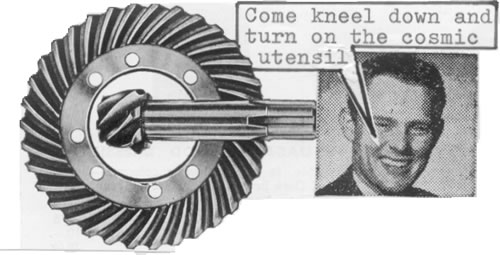
Denunciations of the "inhumanity" of technical progress in fact collude in the myths they pretend to attack. Old forms of human behaviour are handed a specious aura of authenticity: for here, presumably the human truly resides - whereas we know that they are merely forms of exploitation (less efficient from the point of view of profit, perhaps, but simple depression of profit margins doesn't in itself guarantee the presence of workers' power and the possibility of a real humanism). It's too convenient for the purveyors of the culture industry for us to be corralled in one area of debate, stuck in one spectacular "controversy": such backwater eddies can keep protestors circling indefinitely, as indeed has religion since the year dot. Guiltless sexual indulgence is one possibility created by capitalism, but this is quickly geared to a profit system that aims to have the fantasy for you - and make you pay - before it's even consciously occurred (Herbert Marcuse's "repressive desublimation"). It is important to work out the correct, materialist response to the operations of commercial manipulation, or there will be no hope of understanding Henry James - or anything else for that matter.
The materialist response is not to be arrived at through meditation, sitting complacently behind the smoked glass windscreens through which the privileged view the world, but through activity: the manufacture of products and attitudes that will be, precisely, unpleasurable in the commodity sense (but may have all else going for them). Hence poodle play's infantile insistence on "pert". The pitfall of following the ineluctable slide of textual analysis into social comment without pursuing the pleasure in the text to its selfdestructive (poodle) conclusion is well illustrated in Stephen Heath's recent book, The Sexual Fix (30). Here the doyen of Tel Quel and Screen obscurantism turns to the masses, it would seem, to speak to them of his deepest and most heartfelt worries. In deference to Shirley Panken, Ph D, author of The Joy of Suffering: Psychoananalytic Theory and Therapy of Masochism (New York, 1973), whose unconscious, proclivity- and career-determining moniker is surely "Spanken", I shall refer to Heath as Sheath.
Sheath is an idealist, and his book is further proof, if it were needed, that idealists should not be allowed free rein on anything, least of all sex. Isolated from any inkling of the powers which transform social relations, the idealist must inevitably propose a politics of changing the ideas in your head: hence the convenient liberal overstress on being "right-on" rather than seeing clearly and making political interventions. Sheath is correct to interpret sexual imagery as the bourgeois replacement for religious iconography, but wrong to reduce politics to a personal alteration of sexual impulse; his answer to the demise of religion is to revive guilt and self-hatred in the guise of "anti-sexism". Sheath carries out a survey on various fucks in literature - Thomas Hardy, D.H. Lawrence, Jilly Cooper, Erica Jong, Brigid Brophy and Kate Millet - and finds all but Millett rhetorical, "cosmic", predictable and sexist.
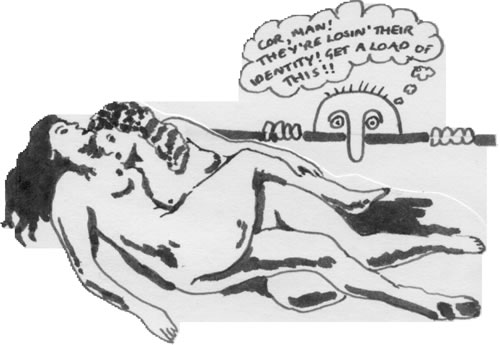
In this, he isn't far off the mark, but the sanctification of Millett is more than a little suspect. Earlier on in the book, Sheath has criticised Wilhelm Reich for maintaining that most people just fuck, whereas the point however is to reach True Orgasm (subsequently vulgarized under the name of "the big O"), calling this "profoundly reactionary and coercive" (p. 59) - but then he does the same thing via Millett: we all just fuck, she and her lucky bedmates "lose their identity". All very nice for her, but it's pretty unconvincing having her subJoycean sex-gush-speak proposed as the icon of a new sexuality beyond the Fix: one gets the feeling that it is its off-limits relationship to Sheath's experience (lesbian sexuality being one of the things men can only observe from without) that explains its basic appeal. Idealism only credits the written word, so Sheath's sexual ideal has to be one he can only read about. Idealism overestimates the role of ideas in shaping social practices and institutions: if things are wrong, it is not the fault of the contradictions inherent in a particular economic system, but of those who produce ideas - the "trahison des clercs" denounced by Julien Benda. All social life is subsumed under ideology; there is no real life apart from its representations, so obviously these are of paramount importance. But the ubiquity of ruling class ideas does not abolish class struggle, even if it means that class consciousness may take distorted forms or require co-ordination by a political organization (the Party). Sheath has no idea of sex as a non-literary, lived phenomenon. Because Sheath himself writes books, he likes to think that publications mould the world we live in: the classical megalomania of any spokesperson for their class fraction.
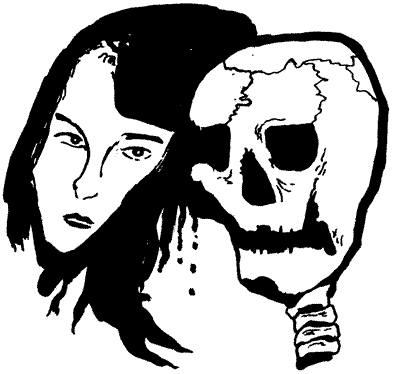 In
line with the traditions of petitbourgeois protest, Sheath of course has his
mystical leanings. He has a notion of the tragedy of sex that transcends history:
"Individuals participate in the reproduction of the species in relation to which
they are transient, held to the price of individual death, but are at the same
time, as individuals, in excess of that simple species function, caught up in
all the sense of the individual history that is theirs, all the desire that
gives." (p. l46). These morbid reflections heark back to the structuralist profondeurs
of Sheath's Tel Quel articles on Finnegans Wake: in fact the "species" does
not exist outside living individuals, it's an ideological abstraction - one
frequently used to justify class society and the murderous treatment of the
many of those who make up the "species". In Sheath's schema, this pathos of
death and sex will persist whatever happens to history: a convenient niche for
a "radicalism" that has by-passed elementary class struggle. To their credit,
the Marquis de Sade and the Sex Pistols - though undoubtedly ultra-left - saw
that the structures of desire in society are shaped by real, concrete, historical
institutions: the Papacy, the Monarchy, nationalism, racism, patriarchy: their
radicalism is materialist, not transcendental.
In
line with the traditions of petitbourgeois protest, Sheath of course has his
mystical leanings. He has a notion of the tragedy of sex that transcends history:
"Individuals participate in the reproduction of the species in relation to which
they are transient, held to the price of individual death, but are at the same
time, as individuals, in excess of that simple species function, caught up in
all the sense of the individual history that is theirs, all the desire that
gives." (p. l46). These morbid reflections heark back to the structuralist profondeurs
of Sheath's Tel Quel articles on Finnegans Wake: in fact the "species" does
not exist outside living individuals, it's an ideological abstraction - one
frequently used to justify class society and the murderous treatment of the
many of those who make up the "species". In Sheath's schema, this pathos of
death and sex will persist whatever happens to history: a convenient niche for
a "radicalism" that has by-passed elementary class struggle. To their credit,
the Marquis de Sade and the Sex Pistols - though undoubtedly ultra-left - saw
that the structures of desire in society are shaped by real, concrete, historical
institutions: the Papacy, the Monarchy, nationalism, racism, patriarchy: their
radicalism is materialist, not transcendental.
Sheath shores up his political radicalism by resolving to reconsider the slogan, "Porn is the Theory - Rape is the Practice". This choice is revealing. The slogan is a parody of the classical marxist-leninist insistence on the inseparability of theory and practice. Common sense maintains that theory and practice have precious little to do with each other: it therefore means a lot more to the Left than it does to the woman in the street. Its sexualised twist is hence anti-leninist rather than purely anti-sexist. From the marxist point of view, what's wrong with the slogan is that the point about erroneous ideas is that they are CONTRADICTORY - precisely NOT theoretical. There aren't a thousand different theories behind every thousand obnoxious actions: there is only one theory (in theory) and therefore (in theory) only one practice. Of course there are disagreements - theory is nothing if it is not a dialectic of debate. On the Left, WE have theory, whereas reaction merely runs this way and that in an attempt to justify class rule: there is only one theory as there is only one world system to analyses. The feminist version confuses the marxist relationship between theory and practice - which is an ideal relation that must be fought for and held on to (the need for a Party) - with the bourgeois distinction between thought and action. Because porn is printed on paper and consumed by wankers in private it does indeed resemble bourgeois "thought"; and rape, because it's violent, looks like "action". But reaction does not operate by understanding (theory) and then acting on the basis of that understanding (practice) - it is contradictory. There is no "theory" behind sexism any more than there is "theory" behind import controls; there are ideological arguments and mystifications which it is theory's task to expose. The slogan, though, suits Sheath - not because it successfully describes the real relationship between pornography and sexist violence, but because it sneers at marxism (the argument that it is possible to understand the world and so change it), and because it assumes that what is wrong with life under capitalism is the circulation of bad ideas. What he should be concerned about is not that "evil" theory is put into practice, but that true theory is not. Sheath advises us to step out of the sheltered confines of the library and the Arts Theatre and gaze with horror at the mass culture industry: "Go to a film, switch on the TV, open a magazine - can we really think we are free, at liberty?" (p. 150). Obviously such vulgarities are the only reminders of unfreedom that come into Sheath's rarified existence - never mind crap homes, lousy jobs, the troops in Ireland, the Falklands War, the defeat of the hospital workers, unemployment. One's heart simply bleeds. The problem is the paucity of conduits for virtuous souls like Sheath to influence the mass. In this zone of moralism, it's amusing how frequently the Althusserian concept of "interventions in ideology" veers towards Clive Bell's rightist call for one hundred paid Bloomsburyites to civilise the nation through Coleridgean permeation (31). And of course Sheath falls for the classic "intervention" beloved of mystics since time began - he proposes a new PRAYER: "The American poet and writer [she won't be a bus-driver, will she? - OTL] and feminist Adrienne Rich has a poem entitled "The Stranger" with the following lines:
If they ask me my identity
what can I say but
I am the androgyne
I am the living mind you fail to describe
in your dead language
the lost noun, the verb surviving
only in the infinitive
They are lines we should almost repeat to ourselves every time we read, asking not for the old identities, "male" and "female", "the man" and "the woman" . . ." (p. 135) Ah yes, equal pay in no time! Co-habitation laws? Single-parent mothers? Rape? No problem! Then there's the footnote where Sheath lets off steam against the "current conversational usage of bisexuality" because it leads to identification: "What you cannot be allowed to be is sexual, multiple, various, a kaleidoscope of moments and possibilities, infinitely desiring ..." (p. l42, n. *). Since in my experience the kinds of questions requiring in such identifications are usually asked by people who fancy dragging the person under discussion into bed, and want to establish if they stand a chance, Sheath's strategy is no doubt to wave his hands around in the air at parties and announce: "Hello! I'm a kaleidoscope."
However, even
hopeless old hippies are capable-of reading Henry James - Sheath too is drawn
to the old master in framing a sexual analysis for our time (indeed it was this
that necessitated a look at The Sexual Fix). 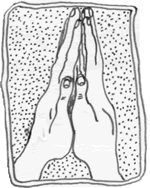 Sheath
takes us through a sentence in The American in three versions: the original
one of 1877, and two changes for the edition of 1907. He notes an increasing
insistence on a stereotyped fuck but (the Lord be praised) "everything is not
quite sewn up". He concludes that although James did unfortunately see the sexual
as fundamental, he predicts the righteous twentieth-century vision with "a psychology
of infinite subtlety, endlessly ramifying the complexity of the confusion of
identity." (p. 1OO). He misses the crude fucks which scream through all the
hesitations and refinement! This is because Sheath only respects the "individuality"
of a writer, denouncing a text if it illustrates a common pattern, disdaining
the opportunity to read off concrete information on the sexual substructure.
This petitbourgeois individualism casts Sheath as an evasive jerk. The common
pattern is, after all, something we all live through - the rest is just gnomes
in the garden! Sheath's slide from textual analysis to social critique is premature,
he leaves his texts intact, the meanings still smiling with individual choices
that merely ratify an oppressive system, and generate political lessons which
are pessimistic and reactionary.
Sheath
takes us through a sentence in The American in three versions: the original
one of 1877, and two changes for the edition of 1907. He notes an increasing
insistence on a stereotyped fuck but (the Lord be praised) "everything is not
quite sewn up". He concludes that although James did unfortunately see the sexual
as fundamental, he predicts the righteous twentieth-century vision with "a psychology
of infinite subtlety, endlessly ramifying the complexity of the confusion of
identity." (p. 1OO). He misses the crude fucks which scream through all the
hesitations and refinement! This is because Sheath only respects the "individuality"
of a writer, denouncing a text if it illustrates a common pattern, disdaining
the opportunity to read off concrete information on the sexual substructure.
This petitbourgeois individualism casts Sheath as an evasive jerk. The common
pattern is, after all, something we all live through - the rest is just gnomes
in the garden! Sheath's slide from textual analysis to social critique is premature,
he leaves his texts intact, the meanings still smiling with individual choices
that merely ratify an oppressive system, and generate political lessons which
are pessimistic and reactionary.
This is the political agenda behind poodle play's investigation of the "pert" hidden inside Joe's Garage: unlike Sheath, poodle play refuses to take writers on their own terms, prefering instead to plunder them for the specific insight. PERT is a key word because it trembles with the problems of character and anatomy, the offense in appropriating the involuntary reflexes of the female body to a vocabulary of twee social intercourse; but it also contains the possibility of being used the other way - like an enzyme that speeds, say, conversion of sugar into glucose. Given the right sort of chemical environment it could start building up sugar from more elementary molecules. Or better, it resembles taking a readymixed King Tubby 12" into the Comet showroom and watching the assistant turn up the bass and blow out the speakers. Things go both ways, though the media do their best to conceal this dialectical truth. The imagination behind things that go both ways returns (via shunting trains) to the pumping of sexual intercourse, as here: "He had wit enough to appreciate the force of that civility which consists in calling your attention to the impertinences it spares you." (The American, p. 142). The impertinences being spared the reader are all kinds of physical details and anatomical embarrassments lurking in the exchange between the two men: and just as Valentin spares Newman by stressing the fact, so Jamesian prose remains delicate by continually laying itself open to the gross interpretation.
In the account
of the colonel's foot there is a zestful facetiousness, a humorous overkill
by eloquence that takes delight in fetishized objectivity. This kind of wild,
hysterical nihilism found its zenith in Wyndham Lewis (eg "the crooket-like
floral pastiches on the ridges of her head-gear looked crisped down in a threatening
way: her nodular pink veil was an apoplectic gristle." (32)), its popularisation
in Samuel Beckett (eg "his rocking-chair of undressed teak, guaranteed not to
crack, warp, shrink, corrode, or creak at night . . The eyes cold and unwavering
as a gull's stared up at an iridescence splashed over the cornice moulding .
. " (33)) - though the violenge has here been dissipated in humourous reference
to commercial hype, a violence Zappa was able to restore by taking part in the
aggressive commodification to which it is a response (eg "and all the rest of
whom for which to whensonever of partially indeterminate bio-chemical degradation
seek the path to the sudsy yellow nozzle of their foaming nocturnal parametric
digital whole-wheat inter-faith geo-thermal terpsichorean ejectamenta" (34)).
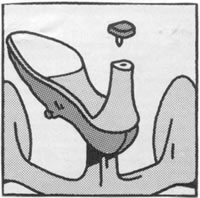 James can refer
to a woman "having once more slid down telescope-wise into her scanty petticoats"
(The American, p. 137) and still better: "her tight bodice seemed to crack with
vivacity; and from beneath the stiff plaits of her petticoat a small fat foot
protruded, resting upon a stilted heel. She was attractive and impertinent.'
(The Bostonians, p. 7). The atmosphere is so dry and hard that electricity crackles
in the air; the small fat foot protrudes phallically; her "stilted heels" pun
together the stilts of the clown, the boots caressed by the catatonic fetishist
and the elongation of the penis and nipple in arousal. It is no accident that
"impertinent" should spring up here: its unconscious "pert" describes the stiffened
nipple, congealing the effects of cold and sexual excitement. Humour arrives
to replace the evacuation of human meaning from what is describe, laughter of
recognition and also of concealment - since alienation is not really very funny.
It is politically accurate to refer back the black facetiousness of this kind
of writing, its gleeful externality, to the meaninglessness of commodity exchange
under the iron law of profit: many of its features are derived from the telling
but empty claims of advertising copy. There are of course reactionary elements
in this, the danger of returning to a collusive relationship with commodity
exchange: either the Cold War arrogance of Pop Art or, in the European version,
the banalities of the spectacle loved for their cosiness, a last vestige of
human decency in references to Lapsong Souchong and Ovaltine. In fact, far from
being subversive, the charm of out-dated commercial imagery posits a reactionary
humour, implying that a truly humanized society existed before the latest technological
developments; going back to a primitive means of production rather than transforming
the current relations of production. Despite Samuel Beckett's fine moments -
the slow death of Belacqua's lobster, the lashed ovaries in the omelette, the
hatred for ducklings on a spring morning - his language is finally not tough
enough to evade local colour and the establishment's accolades. Of course, Beckett
struggles against his tendency towards entertaining whimsy, his "Irishness'
(most nauseatingly developed in Flann O'Brien), but only by writing in French
and becoming still more abstract and puritan, returning to his loyalist Protestant
standards: finally turning out the empty boredoms the bourgeoisie recognizes
as profound (most tediously commercialised by Harold Pinter). James' sentences,
on the other hand, resist recuperation as consolation for the degrading effect
of commodity speak on eloquence, because this is an issue that is not explicitly
worked on - instead they pack in the structures through which we live, achieved
by a dense sexualization.
James can refer
to a woman "having once more slid down telescope-wise into her scanty petticoats"
(The American, p. 137) and still better: "her tight bodice seemed to crack with
vivacity; and from beneath the stiff plaits of her petticoat a small fat foot
protruded, resting upon a stilted heel. She was attractive and impertinent.'
(The Bostonians, p. 7). The atmosphere is so dry and hard that electricity crackles
in the air; the small fat foot protrudes phallically; her "stilted heels" pun
together the stilts of the clown, the boots caressed by the catatonic fetishist
and the elongation of the penis and nipple in arousal. It is no accident that
"impertinent" should spring up here: its unconscious "pert" describes the stiffened
nipple, congealing the effects of cold and sexual excitement. Humour arrives
to replace the evacuation of human meaning from what is describe, laughter of
recognition and also of concealment - since alienation is not really very funny.
It is politically accurate to refer back the black facetiousness of this kind
of writing, its gleeful externality, to the meaninglessness of commodity exchange
under the iron law of profit: many of its features are derived from the telling
but empty claims of advertising copy. There are of course reactionary elements
in this, the danger of returning to a collusive relationship with commodity
exchange: either the Cold War arrogance of Pop Art or, in the European version,
the banalities of the spectacle loved for their cosiness, a last vestige of
human decency in references to Lapsong Souchong and Ovaltine. In fact, far from
being subversive, the charm of out-dated commercial imagery posits a reactionary
humour, implying that a truly humanized society existed before the latest technological
developments; going back to a primitive means of production rather than transforming
the current relations of production. Despite Samuel Beckett's fine moments -
the slow death of Belacqua's lobster, the lashed ovaries in the omelette, the
hatred for ducklings on a spring morning - his language is finally not tough
enough to evade local colour and the establishment's accolades. Of course, Beckett
struggles against his tendency towards entertaining whimsy, his "Irishness'
(most nauseatingly developed in Flann O'Brien), but only by writing in French
and becoming still more abstract and puritan, returning to his loyalist Protestant
standards: finally turning out the empty boredoms the bourgeoisie recognizes
as profound (most tediously commercialised by Harold Pinter). James' sentences,
on the other hand, resist recuperation as consolation for the degrading effect
of commodity speak on eloquence, because this is an issue that is not explicitly
worked on - instead they pack in the structures through which we live, achieved
by a dense sexualization.
Two further illustrations
of the phallic cluster brought in tow by "pert" in James: "the high impertinence
by the aid of which great people, les grands seigneurs, persons of her husband's
class and type, always know how to re-establish a violated order.' (The Golden
Bowl, p. 448). Here the Prince's pert, like Melanie Klein's good phallus, is
a healing talisman - high, great and grand - though there are also fascistic
overtones, the notion of an aristocratic restoration of bourgeois order, Martin
Eden's "man on horseback" (35). It is to his pertinacity that Nick Dormer appeals
when he compares himself to Miriam: "He cared enough for it, whatever it would
be, to feel that his pertinacity might enter into comparison even with such
a productive force as Miriam's." (The Tragic Muse, p. 497). Little doubt that
Nick expects biology to prove his point, comparing genitalia in the playground.
It is the continual shift in James - "it, whatever it would be" - which leads
so easily to sexual reduction. Sheath objects to this procedure - at one point
he travesties his beloved psychoanalysis, finding castration in red herrings
and cocks in some other irrelevance, parodying manoeuvres dear to poodle play
- but it is not our intention to proceed by proof, but to ask why such obvious
conclusions haven't been drawn before: to speculate on what such observations
do to the authority of the text; to question the truth of a dignity that relies
on repression. Whatever Sheath's paranoias about the enforced phallo-centricity
of psychoanalysis - and here, adopting the predictable iconoclasm of cranky
irrationalists, he ditches Freud, Lacan, all his heroes - it can hardly be said
that suggesting that James is a connoisseur of the pert nipple as phallus makes
the world a more sexist place in which to live. Certainly demystification of
the poetic "successes" and psychological "insights" of explicit reactionaries
like James is necessary if we're to demolish high culture without fooling ourselves.
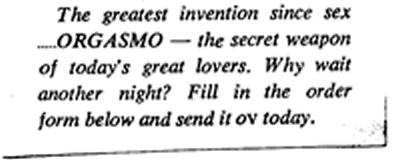 Poodle play is
concerned to explicate the passages where meaning appears to go at right angles,
can suddenly be seen as a product of the code viewed from outside rather than
communicated naturally and suavely. This unfortunately means that at times poodle
play will suffer from the excesses of connective mania that characterise its
chosen objects: this is inevitable, the time for including these insights merely
as metaphorical ballast ("the deposits of this referential alluvium" etc) has
passed. Poodle play needs to KNOW how art works, it can't keep quiet.
Poodle play is
concerned to explicate the passages where meaning appears to go at right angles,
can suddenly be seen as a product of the code viewed from outside rather than
communicated naturally and suavely. This unfortunately means that at times poodle
play will suffer from the excesses of connective mania that characterise its
chosen objects: this is inevitable, the time for including these insights merely
as metaphorical ballast ("the deposits of this referential alluvium" etc) has
passed. Poodle play needs to KNOW how art works, it can't keep quiet.
The invitation to summary in initial letters by James' formulations has already been touched on: it results from the overload of meaning causing short circuits, suggestions crackling into life across words. When Charlotte is slow to help out the Prince while he struggles to articulate his view of their relationship to the Ververs, James concludes: "only on the eve of their visit's end was she, for once, clear or direct in response." (The Golden Bowl, p. 255). Mr Verver's first name is Adam; the name Verver contains the letters of the name Eve as does the phrase "eve of their visit's end" (twice: once as "eve" and once as a word spelled out by initial letters of "eve", "visit" and "end"). The end of their visit looms like an expulsion from Paradise, the end of Adam's innocence. Charlotte becomes a guilty Eve corrupted by the Prince's snakey phallus. Another example, again from The Golden Bowl: "whereas what she intelligently needed was to know where she was going" (p. 395). The presiding word is "ink" ("Intelligently Needed to Know"), a selfdescriptive term for James' own employment of the liquid, which sets up the need to know without satisfying it, constantly surrendering to the misdirections of libidinal suggestions and possibilities. When in The Tragic Muse Grace Dormer declares that George Dallow "used to look greasy" and that his iname ought to have been "Tallow", Lady Agnes upbraids her, telling her not to be "vulgar" (p. 13): yet precisely these kinds of typographical shifts and changes construct the underlying resonances of James' prose. The vulgarity of making a joke on someone's name is the vulgarity of recognizing how meaning is transmitted. This recognition is ever repressed, but in unconscious form it elaborates vast networks of irresponsible and arbitrary association along which we think and along which James's writing rides.
James responds
to the position of words as to a physical stimulus, the intensity of a meant
sexual contact. Verena ponders in "The Bostonians": 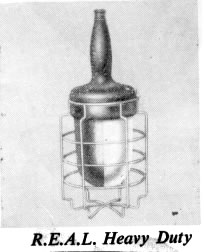 "it
was one thing to choose for herself, but now the great representative of the
enfranchisement of their sex (from every form of bondage) had chosen for her"
(p. 33) - here the ligatures of parenthesis divide the sentence as surely as
any fetishist's thong. The brackets separate off the utopian possibilities of
feminism from their bourgeois restrictions, representing emancipation for the
society gatherings Verena addresses. It resembles the fetishist's eroticization
of small, significant acts because it makes large social issues hinge on a a
symbol - in this case, the bracket. In a sense, perversion is a model for all
art, being a socially symbolic act in which the relationship between individual
choice and impersonal structure is heightened and dramatized, generating not
peasant idiocy (home is where the heart is, or, fear of the other), but knowledge
of system.
"it
was one thing to choose for herself, but now the great representative of the
enfranchisement of their sex (from every form of bondage) had chosen for her"
(p. 33) - here the ligatures of parenthesis divide the sentence as surely as
any fetishist's thong. The brackets separate off the utopian possibilities of
feminism from their bourgeois restrictions, representing emancipation for the
society gatherings Verena addresses. It resembles the fetishist's eroticization
of small, significant acts because it makes large social issues hinge on a a
symbol - in this case, the bracket. In a sense, perversion is a model for all
art, being a socially symbolic act in which the relationship between individual
choice and impersonal structure is heightened and dramatized, generating not
peasant idiocy (home is where the heart is, or, fear of the other), but knowledge
of system.
Sadomasochism
relates to modernism because both insist on abstraction and reversal, the delight
of a practice that both summarizes contemporary behaviour and puts itself beyond
the pale. Ideology would hold us ever grateful for the freedom to choose between
brands of exploitation. The practice of sadomasochism reveals the arbitrary
nature of our constituted place in the structures of domination that mask themselves
as communication: in "ourselves" we are nothing, anything - only social limitations
allow us to be what we are. In his treatment of contradiction, James comes close
to the SM/modernist distrust of the false options of ideology; an impatience
with the binary oppositions necessary for "communication" which in fact take
the most basic decisions as read: "her companion led her, intellectually, a
dance in which her feet - that is, her head - fail her at times for weariness."
(The Bostonians, p. 95). The opposition between feet and head, low and high,
physical and mental is one of the founding propositions of platonic repression
(challenged in Bootsy's formula "Free yer ass and yer mind will follow"). Here
the adducement of vividness via concrete reference, the image of dancing, invades
and puts at risk the so-called natural order.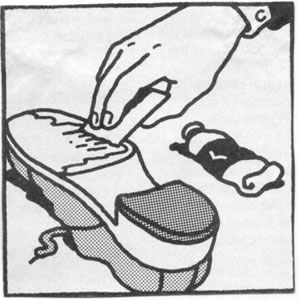 This
is an order whose artificiality is stressed in the boot lickings and toe suckings
of SM sex.
This
is an order whose artificiality is stressed in the boot lickings and toe suckings
of SM sex.
In James' reversal is also a despair about the effectiveness of ideas. It should be borne in mind that despair with the choices of liberal ideology can either drive the individual to archaic regression (of which fascism is the political expression) or revolutionary action. "The inconsistent little lady of the Avenue d'Iena had an insuperable need of changing her place, intellectually. She had a lively imagination, and she was capable, at certain times, of im agining the direct reverse, of her most cherished beliefs, with a vividness more intense than that of conviction. She got tired of thinking aright; but there was no serious harm in it, as she got equally tired of thinking wrong." (The American, p. 114). This describes the neurotic state bourgeois thought reaches when it discovers its inability to do more than reflect, since to realize that society is actually made from the action of sentient human beings who think and act accordingly would be to destroy the myth that society is natural, and this myth is the linch-pin of ideology. This of course was the proposition of Dada: beautiful works of art don't prevent war, so why not make ugly ones (the critics' response being to find even urinals beautiful (36)). James himself does not enter the despair with meaning that he portrays in his characters - usually, with a note of irony and slight contempt - but that is because his intention is to enjoy a play of contradictory language which he feels bodies forth truth elsewhere. "You see too much - that's what may sometimes make you difficulties. When you don't, at least, see too little." (The Golden Bowl, p. 34). The endless ramifications of what Mr Verver might or might not surmise become a model for the anxieties of ideology, which must know everything excluding itself: a positivism which must become increasingly unstable as the economic system on which it feeds proceeds to precisely transform every object under scrutiny (except perhaps the stars, and certain unpleasant-looking deepsea fish). The Golden Bowl is studded with such throwaway contradictions: for James vacillation between opposites, far from delaying accurate statement, approaches more nearly truth. "Only the funny thing, he had respectfully submitted, was that her father, though older and wiser, and a man into the bargain, was as bad - that is as good - as herself." (The Golden Bowl, p. 35). The interest of the writing does not arise because he is able to fix the "real" thought-processes of his protagonists; the interest lies in the way his language condenses and enacts real contradictions and crises in the ideological re-working of the social totality.
It is illuminating
to contrast two passages, one written in 1890 by Henry James, and the other
written in 1909 by Sigmund Freud: 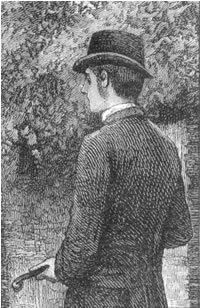 "a
fidgety walk up Bond Street, during which he looked at his watch three or four
times while he paused at shop windows for fear of being a little early. In the
cab . . the fear that he should be too early took curiously the form of a fear
that he should be too late: a symbol of the inconsistencies of which his spirit
at present was-full. Peter Sheringham was nervous, too nervous for a diplomatist,
and haunted with inclinations . . and indeed with purposes, which contradicted
each other. He wanted to be out of it and yet he dreaded not to be in it, and
on this particular occasion the sense of exclusion made him sore." (The Tragic
Muse, p. 3O6).
"a
fidgety walk up Bond Street, during which he looked at his watch three or four
times while he paused at shop windows for fear of being a little early. In the
cab . . the fear that he should be too early took curiously the form of a fear
that he should be too late: a symbol of the inconsistencies of which his spirit
at present was-full. Peter Sheringham was nervous, too nervous for a diplomatist,
and haunted with inclinations . . and indeed with purposes, which contradicted
each other. He wanted to be out of it and yet he dreaded not to be in it, and
on this particular occasion the sense of exclusion made him sore." (The Tragic
Muse, p. 3O6).
"Another obsessional patient once told me the following story. He was walking one day in the park at Sch"nbrunn when he kicked his foot against a branch that was lying on the ground. He picked it up and flung it into the hedge that bordered the path. On his way home he was suddenly seized with uneasiness that the branch in its new position might perhaps be projecting a little from the hedge and might cause an injury to some one passing by the same place after him. He was obliged to jump off his tram, hurry back to the park, find the place again, and put the branch back in its former position . ." (37) Both passages describe sensations characterised by their modernity: Beowulf did not suffer from such problems; nor did Dr Johnson. There is something shameful about what is going on - neither Peter Sheringham nor Freud's patient would have relished public retelling of what happened. The model for the shameful individual act is masturbation. It was confusion between the symptoms of consumption and the supposed "symptoms" of masturbation that made the Romantics' sufferings so unspeakable for the middle classes. It is significant that Peter's anxiety should work against his career - "too nervous for a diplomatist" - and Peter and Nick are indeed parallel cases, each find their paths to promotion and recognition blocked by the temptations of artistic and personal gratification, which focus (for both) on Miriam. "Do you give up your name, do you give up your country?" asks the dying Mr Carteret when Nick expresses his desire to pursue a career in painting rather than politics (p. 360). "If his mother had seen him she might have thought he was staring at his father's ghost" (p. 373) - James here again disinters Hamlet's father to stress psychological pressures (a useful model in the absence of the Freudian system) - Nick torn between the pursuit of social acclaim (the patriarchal order represented by the terrifyingly virile Julia Dallow) and libidinal gratification (Miriam, a regular Jewish princess, her race and profession setting her outside respectability). "He wanted to be out of it and yet he dreaded not to be in it" and the suddenly physical conclusion on the word "sore" inevitably recalls the dilemma of "Dinah-Moe Humm": "to get yourself into it you've got to get out of it", the tight vaginal standards of the opposite camp, or the loose anal slippers of blamelessness. Sexual quandary is always diversionary: choosing one or the other is still to be locked on the level of the symbolic, making decisions in the terms layed down by ideology. Likewise, Freud does not advise his patient to go back and put the stick back in the hedge, or leave it in the path: he attempts to explain what the contradictory actions MEAN. He says "it was bound to be more dangerous to passersby in its original position than where he had put it in the hedge. The second and hostile act, which he carried out under compulsion, had clothed itself to his conscious view with the motives that really belonged to the first and philanthropic one." (38) Given the structural opposition in The Tragic Muse (bohemianism and buggery versus national service and propagation), it would be impossible to provide a psychoanalytic resolution of Peter's problem without a political deconstruction of its mythical oppositions. In concentrating on the reverberation of such moments, not allowing their dubious and disshevelled character to deter him, James provides us with a cameo of the ideological contradictions of his generation: there can be no question of psychoanalytic "reductionism" as far as his texts are concerned, indeed a rightwing freudianism committed to individual solutions could only choke on them - they in fact insist on the return of psychoanalysis to the social and political arena.
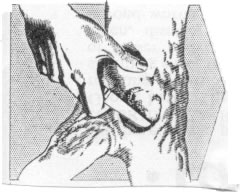 When
reference Is made to the baroque sexuality concealed in the verbal transactions
of James' language, this is not simply to imply that he was a dirty old man
(though one hopes he was). What leads to the eroticized encounter between fetish
and flesh in his writing is the very process of delineating the passage of thought,
pursuing moral and emotional considerations through to their conclusions. James'
hesitations, like those of the obsessional neurotics Freud analysed, stress
the universal exchangeability of metaphor; his sexual fetishism - the blatant
eruptions of all the commercialized apparatus of "perverted" sex into the text
- is a result of dramatizing genteel transactions as super-structural enactments
of an economic system that sacrifices living labour to the needs of dead labour;
gearing life and death and history to the accumulation of capital. The sexual
becomes a means of bridging the theoretical chasm between idea and commodity,
language and production: "the labour of this detachment, with the labour of
keeping the pitch of it down, held them together in a steel hoop of intimacy
compared with which artless passions would have been but a beating of the air.'
(The Golden Bowl, p. 396). Labour: pitch: steel: beating. This is a restatement
of William Blake's original conception of the body politic, which had less to
do with the ruling class's idea of the national interest than with working class's
physical experience of work with machinery, their libidinal investment in heavy
industry. Here though there is not the agonized schizophrenia of Urizen's tyranny,
an exploited and oppressed class resisting the very thought and science their
labour has made possible: here is a positive erotic of exploitation. Flagellation
is going on: it is not air that's being beaten, but flesh. The literal "labour"
of the piece is the labour of repression, the refusal to acknowledge the adulterous/incestuous
shadow to the Ververs' respective marriages; nevertheless the images of industry
- the linking and unlinking of railway engines, laying down tarmac, hammering
steel - generate industrial amd social parallels, the fuck conceived as the
truth around which the social totality dances. The sexual used as the naturalizing
seal on domination and exploitation:
When
reference Is made to the baroque sexuality concealed in the verbal transactions
of James' language, this is not simply to imply that he was a dirty old man
(though one hopes he was). What leads to the eroticized encounter between fetish
and flesh in his writing is the very process of delineating the passage of thought,
pursuing moral and emotional considerations through to their conclusions. James'
hesitations, like those of the obsessional neurotics Freud analysed, stress
the universal exchangeability of metaphor; his sexual fetishism - the blatant
eruptions of all the commercialized apparatus of "perverted" sex into the text
- is a result of dramatizing genteel transactions as super-structural enactments
of an economic system that sacrifices living labour to the needs of dead labour;
gearing life and death and history to the accumulation of capital. The sexual
becomes a means of bridging the theoretical chasm between idea and commodity,
language and production: "the labour of this detachment, with the labour of
keeping the pitch of it down, held them together in a steel hoop of intimacy
compared with which artless passions would have been but a beating of the air.'
(The Golden Bowl, p. 396). Labour: pitch: steel: beating. This is a restatement
of William Blake's original conception of the body politic, which had less to
do with the ruling class's idea of the national interest than with working class's
physical experience of work with machinery, their libidinal investment in heavy
industry. Here though there is not the agonized schizophrenia of Urizen's tyranny,
an exploited and oppressed class resisting the very thought and science their
labour has made possible: here is a positive erotic of exploitation. Flagellation
is going on: it is not air that's being beaten, but flesh. The literal "labour"
of the piece is the labour of repression, the refusal to acknowledge the adulterous/incestuous
shadow to the Ververs' respective marriages; nevertheless the images of industry
- the linking and unlinking of railway engines, laying down tarmac, hammering
steel - generate industrial amd social parallels, the fuck conceived as the
truth around which the social totality dances. The sexual used as the naturalizing
seal on domination and exploitation: 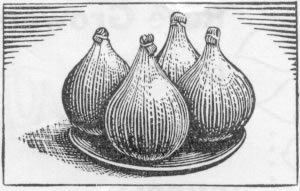 an
ideological stratagem forever concealed from the romantic moralizers who see
any drift of sexuality from the particular individual and the "whole" personality,
as a turn to Evil. It is precisely those who PROTECT the sexual as an area of
simple, homely truth - the notion of sex as a tender merging of two individuals
instead of pleasure in testing freedom - who concur in the ideological and unconscious
devices used by Henry James. Sex is elegantly moved from the picture - real,
natural, good sex that is, the kind of sex you and I go in for, that Sheath
teaches - and along with it we obscure the problems of eroticized labour, the
contradictions of commodified desire, wild sex in the working class (38). Once
the mysterious and ineluctable power of the sentence's sexual suggestiveness
is revealed as simply a reference to the desire to be hooped and goosed, and
the connection between masochism and the work ethic displayed, James' covert
proposition - the cosmic fuck as guarantee of the eternal nature of class society
- must surely lose its sinister appeal. Mr Verver leads Charlotte through his
collection as if he had "a long silken halter round her beautiful neck" (The
Golden Bowl, p. 493) and earlier "she felt with her sharpest thrill how he was
straitened and tied" (The Golden Bowl, p. 430) - no doubt the result of "always
living in harness" (The Golden Bowl, p. 3l4).
an
ideological stratagem forever concealed from the romantic moralizers who see
any drift of sexuality from the particular individual and the "whole" personality,
as a turn to Evil. It is precisely those who PROTECT the sexual as an area of
simple, homely truth - the notion of sex as a tender merging of two individuals
instead of pleasure in testing freedom - who concur in the ideological and unconscious
devices used by Henry James. Sex is elegantly moved from the picture - real,
natural, good sex that is, the kind of sex you and I go in for, that Sheath
teaches - and along with it we obscure the problems of eroticized labour, the
contradictions of commodified desire, wild sex in the working class (38). Once
the mysterious and ineluctable power of the sentence's sexual suggestiveness
is revealed as simply a reference to the desire to be hooped and goosed, and
the connection between masochism and the work ethic displayed, James' covert
proposition - the cosmic fuck as guarantee of the eternal nature of class society
- must surely lose its sinister appeal. Mr Verver leads Charlotte through his
collection as if he had "a long silken halter round her beautiful neck" (The
Golden Bowl, p. 493) and earlier "she felt with her sharpest thrill how he was
straitened and tied" (The Golden Bowl, p. 430) - no doubt the result of "always
living in harness" (The Golden Bowl, p. 3l4).
Of Hart Crane,
poodle play asserted that he "was aware of the numerous irrational associations
that pan out from each word like light split in a prism; he considered these
patterns of association as nets which bind and capture meanings which in turn
uses a neo-libidinal energy to push and strain against them." (39) This is to
pose again the question framed at the beginning of the piece: can poodle play
only say one thing, recasting forever its sexual proclivities in the imagery
of industrial production, continually pointing out literary attestations to
the lingering eroticism of commerce and mass production? It has already been
pointed out that to summarise the individuality of the writer is a reactionary
trick: what's interesting about D.H. Lawrence is what he has in common with
Jack London, B. Traven and Ayn Rand, not his unique genius. One facet that the
James version of bondage, as cited above, adds to Crane's, is the knowledge
that the thongs of restriction are products of human labour. Crane's class position
meant that he knew more of the mechanics of production than James, but he is
in fact less aware of its artificial nature: he has before the impingement of
steel hoops the erotic swoon of the aesthete, whereas James is aware that these
devices are forged through WORK. Despite patches of clash and curdle - the erogenous
sewage where Crane's disgust with 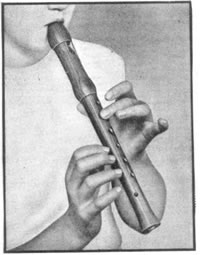 the
marriage of flesh and the metal of machines erupts - the alchemical poeticization
by which he transfers libidinal and economic drives (ie human activities) onto
the astral plane denies work. Of course this transference can also be reversed,
enabling us to sexualize and psychoanalyze "scientific" imagery used by his
contemporaries. Nevertheless, it limits his sexuality to the lyrical and masochistic,
the desperation of the worker who dreams of being eaten (or at the very least,
"pluked" (40)) by the machine. The "work" of repression that James conceives
is verbal and languid, not exploitable in the direct sense, not substantial.
The link between the production of exchangeable commodities and the production
of meaning is not merely (like the Church) founded on a pun: it is founded,
like the unity between the cause of the proletariat and those who would bring
to a halt all forms of oppression, in negativity. (41) The common enemy is a
fetishism that would make both language and material production something God-given
or natural. Just because they're socially-achieved and resist invidividual edicts,
it doesn't mean that society and language are transcendent and immoveable, merely
that a dialectic - a mediation between the one and the many - is required. The
utopian moment is nominalist, specific and various: the sole necessity for unity
is the existence of a common enemy - and there is nothing but the enemy.
the
marriage of flesh and the metal of machines erupts - the alchemical poeticization
by which he transfers libidinal and economic drives (ie human activities) onto
the astral plane denies work. Of course this transference can also be reversed,
enabling us to sexualize and psychoanalyze "scientific" imagery used by his
contemporaries. Nevertheless, it limits his sexuality to the lyrical and masochistic,
the desperation of the worker who dreams of being eaten (or at the very least,
"pluked" (40)) by the machine. The "work" of repression that James conceives
is verbal and languid, not exploitable in the direct sense, not substantial.
The link between the production of exchangeable commodities and the production
of meaning is not merely (like the Church) founded on a pun: it is founded,
like the unity between the cause of the proletariat and those who would bring
to a halt all forms of oppression, in negativity. (41) The common enemy is a
fetishism that would make both language and material production something God-given
or natural. Just because they're socially-achieved and resist invidividual edicts,
it doesn't mean that society and language are transcendent and immoveable, merely
that a dialectic - a mediation between the one and the many - is required. The
utopian moment is nominalist, specific and various: the sole necessity for unity
is the existence of a common enemy - and there is nothing but the enemy.
In his pointilliste
analysis of ruling class quandaries and anxieties James demonstrates an active
sadism refreshing after Hart Crane's selfsurrendering lyricism: "If she wants
a drink she asks me for one and I pour it into her mouth while shb kneels at
my feet. I begin to handle her, feeling her flesh, correcting her posture so
that she feels embarrassed and draws closer to me. I like to hear someone ask
for protection. If she isn't already wearing a collar, I put one on her and
take her over to a mirror behind the bar or in the bathroom, on a wall - and
make her look at it. I don't like women who collapse into passivity." (15).
This intensity of communication and response guaranteed by introducing a game
of fear into sex reproduces the quivering anxieties of the Jamesian text: "the
attitude that the appetite in question maintained in her was to draw peculiar
support moreover from the current aspects and agitations of her victim." (The
Golden Bowl, p. 369). 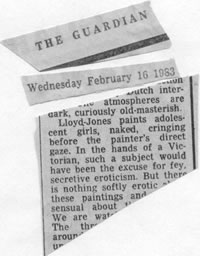 Bondage
in James is woven, deliberately tied by one human being on another - he looks
on with the satisfaction of the bondeur rather than indulging the delights of
the bondee: "The fine web of authority, of dependence that her strenuous companion
had woven about her, was now as dense as a suit of golden mail." (The Bostonians,
p. 146); "the fine tissue of reassurance woven by this lady's hands and flung
over her companion as a light, muffling veil, formed precisely a wrought transparency
through which she felt her father's eyes continually rest upon herself." (The
Golden Bowl, p. 394). The
preparation of the body for visual examination is intimately connected with
the ritual of bondage: her father's eyes actually rest on her piercingly, which
explains the presence of the otherwise arbitrary "precisely" in the phrase.
Bondage
in James is woven, deliberately tied by one human being on another - he looks
on with the satisfaction of the bondeur rather than indulging the delights of
the bondee: "The fine web of authority, of dependence that her strenuous companion
had woven about her, was now as dense as a suit of golden mail." (The Bostonians,
p. 146); "the fine tissue of reassurance woven by this lady's hands and flung
over her companion as a light, muffling veil, formed precisely a wrought transparency
through which she felt her father's eyes continually rest upon herself." (The
Golden Bowl, p. 394). The
preparation of the body for visual examination is intimately connected with
the ritual of bondage: her father's eyes actually rest on her piercingly, which
explains the presence of the otherwise arbitrary "precisely" in the phrase.
"So much plotted freedom was virtually a refinement of reflection" says James in The Golden Bowl (p. 4Ol), evoking the orderly gardens of the ancien regime, the hedges, lawns and fountains of Versailles, imagery deeply embedded in the sadomasochistic imagination: nature pruned and straitened by a despotism and centralization soon to be seized and used by the bourgeoisie.
What is home without
Plumtree's Potted Meat?
Incomplete.
With it an abode of bliss. (42)
Leopold Bloom's jingle is the perfect gloss on the implications of "potted freedom", a sneer which lurks behind the phrase "plotted freedom": the commodified convenience that locks us into an unfree system. Political conspiracy and investment plans make mockery of the freedom of the average citizen. Domestic freedom without the potted meat of carnal intercourse is likewise mockery and frustration. The value of sentences plucked from James is that they place our plotted freedoms in a context that relates outside individual taste and moral judgement: they are accurate psychic responses to the current social order - a reflection of the accumulation of something inanimate, bleak and monstrous, namely capital. James' language is indeed a refinement of reflection, but the resulting formulations bear witness less to the heady essences of spirit than the gross, common or garden crudities of our freedom's limits.
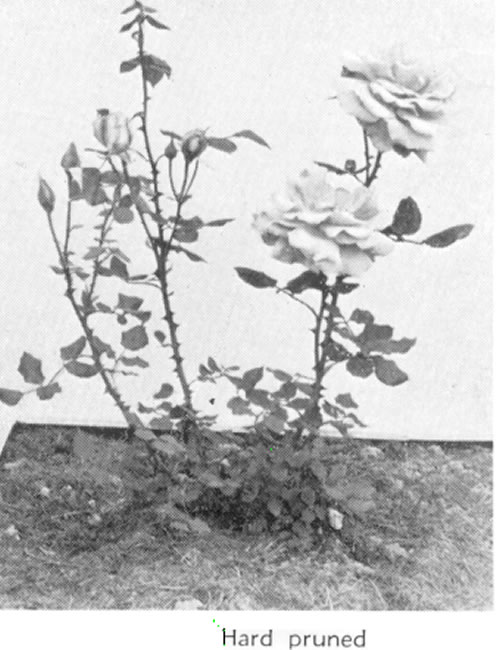
Get You To Critical Literalism Menu
***************************FOOTNOTES***********************
(1) Acknowledgment to Out Of Gas for this insight; it practically induces nostalgia for the Bansteads to recall OOG's revelation, this commendably disingenuous extraction of sitting-room furniture from mexican foodstuffs. Stuff up the cracks and turn on the Gas!
(2) In "Out To Another Lunch Party", Equofinality no 1, 1982, Cambridge.
(3) The objective features which for instance "had made her come instead stupidly, vacantly, boringly, to luncheon" (The Golden Bowl, p. 373).
(4) Equofinality no 1, p. 12.
(5) Colin MacCabe, James Joyce and the Revolution of the Word, 1979, London, p. 122
(6) See Out To Lunch, "Shut Up 'n Play Yer Guitar", Society Pages no 9, Oslo, March 1982, for Zappa's use of a text concerning the severance of a poodle puppy's umbilical cord [a text reprinted in Ben Watson, Frank Zappa: The Negative Dialectics Of Poodle Play, 1993, pp. 409-420].
(7) From "Deadly Jaws" on Sheik Yerbout by Frank Zappa.
(8) Quoted in Leon Edel, The Life of Henry James, 1972, Vol 2, p. 2l5.
(9) Ibid, p. 785.
(10) Leon Trotsky, My Life, 1929, p. 602.
(11) Hamlet, I-v-62-3.
(12) Also, it should be said, supplying egoistic super-cream for the twin-yoked puff-pastry of this regenerated vol-au-vent
(13) In "Frank Zappa: The Negative Dialectics of Poodle Play" in A Vision Very Like Reality no 1, Cambridge, 1979 [a text reprinted in Ben Watson, Frank Zappa: The Negative Dialectics Of Poodle Play, 1993, pp. xi-xii, 262-264]
(14) Ulysses, p. 343.
(15) Pat Califia, "The Sexual Fringe", ZG no 2, 1980, p. 2. (16) This uses Laura Mulvey's observations, especially "You Don't Know What's Happening, Do You Mr Jones?", Spare Rib, February 1973 - it's interesting to note that the impact of this populist (well, ok, hippie) article with its single undeniable observation has far greater impact than more wordy Screen meanderings. See, for example, Rozsika Parker & Griselda Pollock's Old Mistresses, 1981, p. l3.
(17) Fredric Jameson, The Political Unconscious, 1981, p. 289.
(18) Wilhelm Reich, The Mass Psychology of Fascism, 1946, p. 66.
(19) James Joyce, Stephen Hero, 1906, p. 250.
(20) Eg Mark Mattern, Acting In Concert: Music, Community And Political Action, New Brunswick, 1998, p. 65.
(21) See Jah Stone, "Apocalypse Watch" in Judgment Times no 1, 1981, pp 18-19 for a full-blown (college educated) "Rastafarian" version of what is usually encountered as an element in Nazi psychotics.
(22) Theodor Adorno, In Search Of Wagner, 1938, p. 156.
(23) Reference is here being made to Frank Zappa's "Dinah-Moe Humm", Overnite Sensation, 1973.
(24) Jean-Louis Flandrin, "Contraception, Marriage and Sexual Relations on the Christian West", Biology Of Man In History no 1, Selections from Annales, edited Robert Forster and Orest Ranum, 1975, p. 38, n. 41.
(25) Eg David Masson's abominable "Poetic Sound Patterning Reconsidered", The Proceedings Of The Leeds Philosophical And Literary Society, Vol XVI, Part V, pp. 61-124, May 1976 - to be avoided at all costs.
(26) Frank Zappa talking to John Swenson, Guitar World, March 1982.
(27) J.H. Prynne, Poems, p. 3O8.
(28) Ros Coward, "Sexual Violence and Sexuality", Feminist Review no 11, Summer 1982, p. 17.
(29) Mezz Mezzrow, Really The Blues, New York, 1946, p. 327.
(30) To avoid unnecessary disappointment I think I had better make it clear that Mr Heath's book has no illustrations - not even a pic sleeve.
(31) An illustration of the old saying, too much toasting buggers your syntax.
(32) Wyndham Lewis, "Bestre", The Tyro no 2, 1922, p. 53.
(33) Samuel Beckett, Murphy, 1938, p. 5.
(34) Frank Zappa, "Mudd Club", You Are What You Is, 1981.
(35) Jack London, Martin Eden, 1909, p. 273.
(36) Eg Suzi Gablik, Progress In Art, 1976, p. 156.
(37) Sigmund Freud, "Notes Upon a Case of Obsessional Neurosis, commonly known as The Rat Man", 1940, Penguin Freud Library Vol. 9, Case Histories II, p.73, n. 2.
(38) "Wild Sex (In The Working Class)" is a 7" single on A&M records by The Mystic Knights of The Oingo Boingo, who came from LA.
(39) Out To Lunch, "Out To Another Lunch Party", Equofinality no 1, p. 3O. "Neo" appears to be a piece of inevitable insertionism, an unnecessary dangling appendage introduced to gratify some phallic-chauvinist joy in the hyphen; an unconscious expression of the belief that the longer the word the better the sense; an attack of curiously-70s Parisian narcissism which OTL now regrets.
(40) "Pluke" was one of the words contributed by singer Ike Willis to Frank Zappa's Joe's Garage, 1979.
(41) An attempt is here being made to align worker/intellectual interests without making the claims of Ros Coward and John Ellis in their Language And Materialism, London, 1977, which Fredric Jameson rightly calls "fatuous" (The Political Unconscious, Cornell, 1981, p. 45). The whole issue will remain dubious without an explicit examination of specific institutional options and an argument for the Party in the tradition of Lenin, Trotsky, Gramsci and Cliff.
(42) James Joyce, Ulysses, 1922, p. 91.